#1969 birth year
Explore tagged Tumblr posts
Text
guys. i need your opinion of this. because i'm genuinely so confused now
what time period is the professor layton series in?? the prequel trilogy and the main trilogy. when are they supposed to be taking place
i could've sworn one of the games (though i forget which) mentions that someone's been to the moon already which would put them at least in the late 60s into the 70s going by our world's timeline... but i don't know maybe space travel was discovered earlier in this universe???
#melonposting#professor layton#it would be useful if i just had a comprehensive timeline of events in this series so it would be easier to plot things out#but just for the sake of argument... just for funzies...#let's say randall disappeared in 1949#then miracle mask takes place in 1967 (18 years after randall's disappearance in 1949)#and then extrapolating backwards - if luke is 11 and hershel is 35 in miracle mask#then luke was born in 1956 and hershel in 1932#luke is 15 when katrielle is born. so she's born in 1971#he and layton go missing ten years later. that'd be 1981#and then it's another eleven years (when she's 21) that kat has her mystery-solving agency and finds her father and everything. so 1992#(which makes the more modern nonsense we see in her game/anime more plausible)#and just for the heck of it. if we're presuming alfendi is 29 at the same time that katrielle is 21 then he's 8 years older than her#putting his birth year somewhere around 1963#and then... hm... luke is 13 in unwound future. and the explosion in which claire died was said to have happened 10 years prior#so when luke was 3 years old... in 1959#and clive was 13 at that time. exactly 10 years older than luke. so he would've been born around 1946#of course it's hard to pinpoint exact dates when you don't know anyone's birthday or what month a game is taking place in#and of course this is making a ton of assumptions#among other things that the moon landing really did take place in 1969 in this universe#i don't even remember which game mentioned the moon landing! which is annoying!#i think it was unwound future so i tried to have it in the ballpark of 1969 (by placing miracle mask two years prior in 1967)#(going off of luke's ages of 11 in miracle mask and 13 in unwound future as reference of the time passage between them)#at the very least i'm sure the moon landing was referenced somewhere within the prequel or main triologies#so unwound future is the last game it could've been mentioned in. so either it takes place in 1969 or an earlier game in the timeline does#but i'm willing to allow for the moon landing to have taken place before 1969 in the laytonverse. their technology is very weird after all#if i place it somewhere earlier in the 60s then the dates can be pushed back. and this fic i'm reading would be totally canon-compliant!#cuz it describes angela & henry 5 years after randall's disappearance being somewhere in the 1940s#which would only be possible if the moon landing takes place earlier for the dates to be pushed back that far#(of course a minor decade discrepancy does nothing to ruin my enjoyment of the fic. i just think it would be nice to make it all work out)
42 notes
·
View notes
Text




happy 56th birthday
paul rudd
#happy birthday#happy birthday 2025#1969 births#april 6#april 2025#paul rudd#clueless#marvel mcu#ant man#anchorman#the 40 year old virgin#aries#actor
8 notes
·
View notes
Text
Women's Not So Distant History
This #WomensHistoryMonth, let's not forget how many of our rights were only won in recent decades, and weren’t acquired by asking nicely and waiting. We need to fight for our rights. Here's are a few examples:

📍 Before 1974's Fair Credit Opportunity Act made it illegal for financial institutions to discriminate against applicants' gender, banks could refuse women a credit card. Women won the right to open a bank account in the 1960s, but many banks still refused without a husband’s signature. This allowed men to continue to have control over women’s bank accounts. Unmarried women were often refused service by financial institutions entirely.
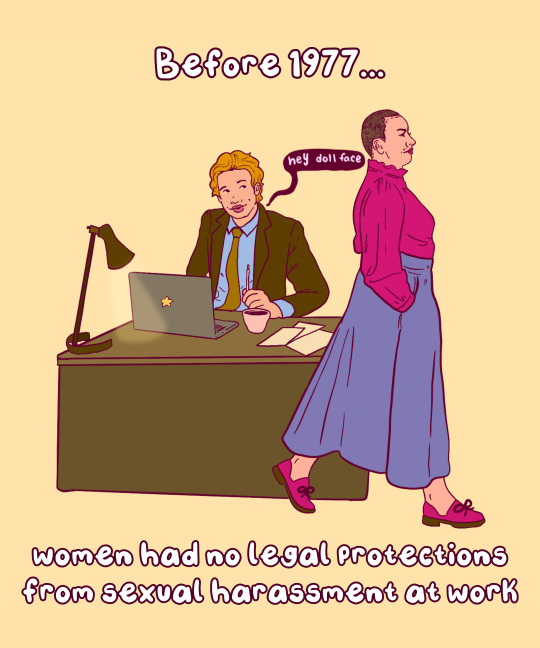
📍 Before 1977, sexual harassment was not considered a legal offense. That changed when a woman brought her boss to court after she refused his sexual advances and was fired. The court stated that her termination violated the 1974 Civil Rights Act, which made employment discrimination illegal.⚖️
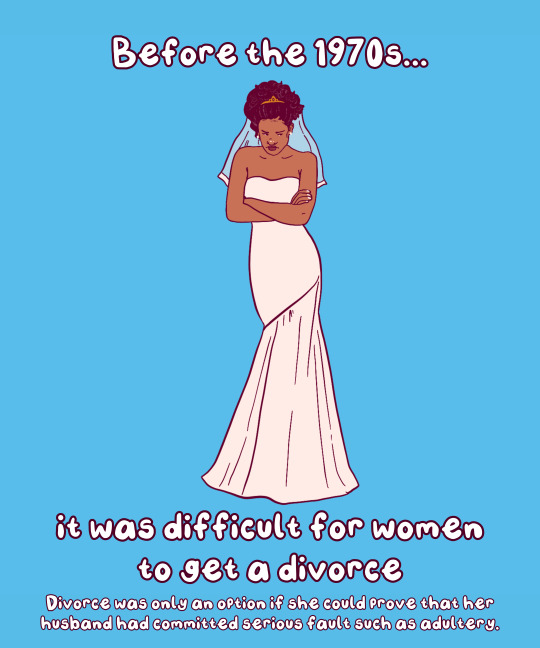
📍 In 1969, California became the first state to pass legislation to allow no-fault divorce. Before then, divorce could only be obtained if a woman could prove that her husband had committed serious faults such as adultery. 💍By 1977, nine states had adopted no-fault divorce laws, and by late 1983, every state had but two. The last, New York, adopted a law in 2010.
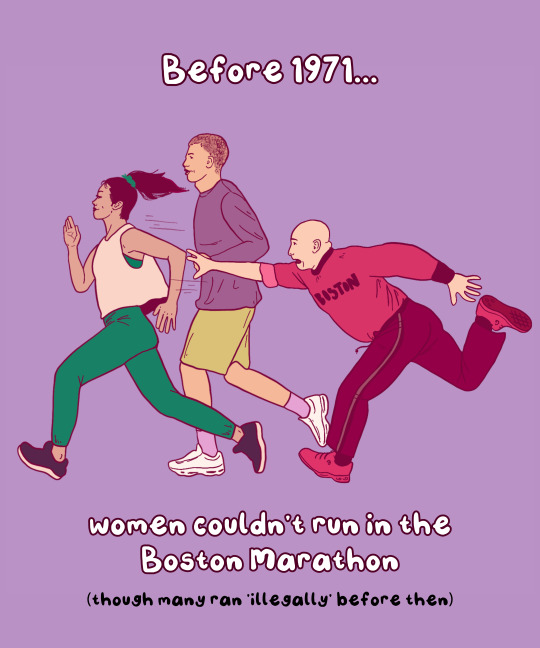
📍In 1967, Kathrine Switzer, entered the Boston Marathon under the name "K.V. Switzer." At the time, the Amateur Athletics Union didn't allow women. Once discovered, staff tried to remove Switzer from the race, but she finished. AAU did not formally accept women until fall 1971.

📍 In 1972, Lillian Garland, a receptionist at a California bank, went on unpaid leave to have a baby and when she returned, her position was filled. Her lawsuit led to 1978's Pregnancy Discrimination Act, which found that discriminating against pregnant people is unlawful

📍 It wasn’t until 2016 that gay marriage was legal in all 50 states. Previously, laws varied by state, and while many states allowed for civil unions for same-sex couples, it created a separate but equal standard. In 2008, California was the first state to achieve marriage equality, only to reverse that right following a ballot initiative later that year.

📍In 2018, Utah and Idaho were the last two states that lacked clear legislation protecting chest or breast feeding parents from obscenity laws. At the time, an Idaho congressman complained women would, "whip it out and do it anywhere,"
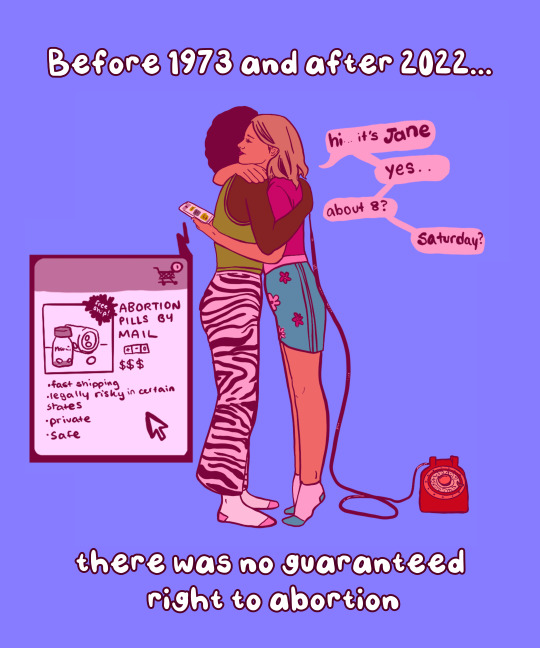
📍 In 1973, the Supreme Court affirmed the right to safe legal abortion in Roe v. Wade. At the time of the decision, nearly all states outlawed abortion with few exceptions. In 1965, illegal abortions made up one-sixth of all pregnancy- and childbirth-related deaths. Unfortunately after years of abortion restrictions and bans, the Supreme Court overturned Roe in 2022. Since then, 14 states have fully banned care, and another 7 severely restrict it – leaving most of the south and midwest without access.
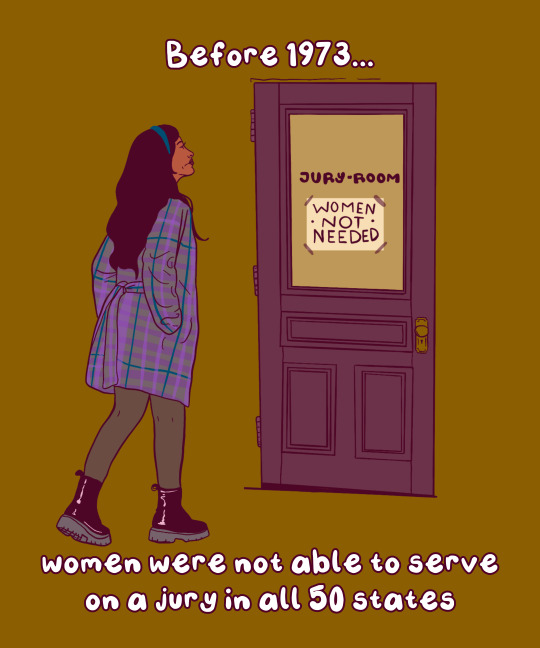
📍 Before 1973, women were not able to serve on a jury in all 50 states. However, this varied by state: Utah was the first state to allow women to serve jury duty in 1898. Though, by 1927, only 19 states allowed women to serve jury duty. The Civil Rights Act of 1957 gave women the right to serve on federal juries, though it wasn't until 1973 that all 50 states passed similar legislation

📍 Before 1988, women were unable to get a business loan on their own. The Women's Business Ownership Act of 1988 allowed women to get loans without a male co-signer and removed other barriers to women in business. The number of women-owned businesses increased by 31 times in the last four decades.
Free download
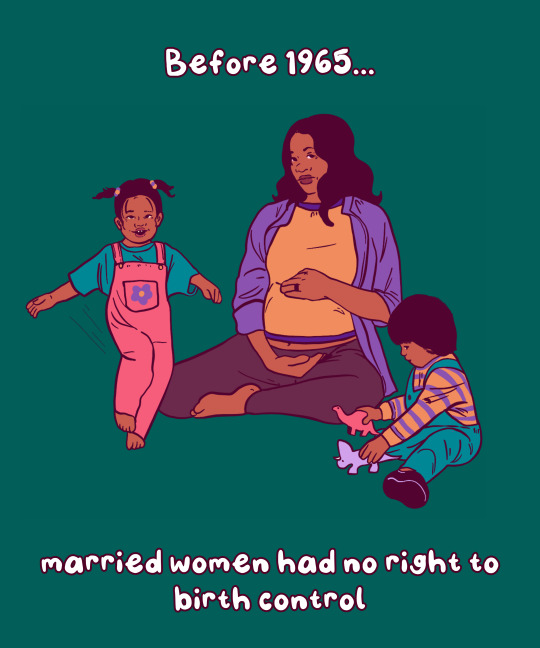
📍 Before 1965, married women had no right to birth control. In Griswold v. Connecticut (1965), the Supreme Court ruled that banning the use of contraceptives violated the right to marital privacy.
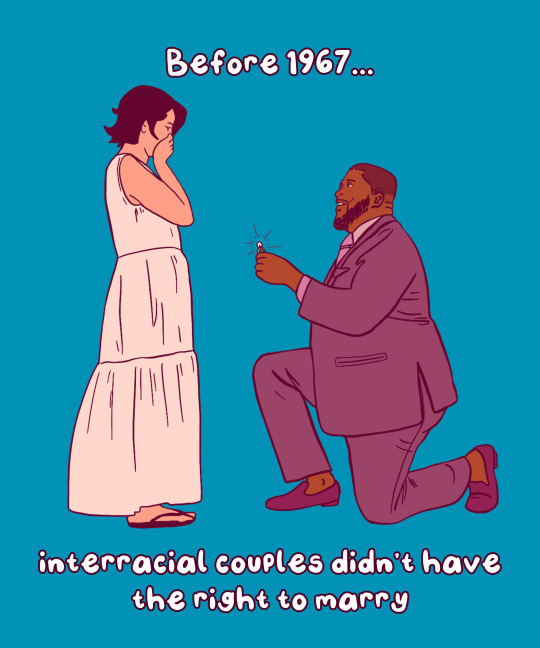
📍 Before 1967, interracial couples didn’t have the right to marry. In Loving v. Virginia, the Supreme Court found that anti-miscegenation laws were unconstitutional. In 2000, Alabama was the last State to remove its anti-miscegenation laws from the books.

📍 Before 1972, unmarried women didn’t have the right to birth control. While married couples gained the right in 1967, it wasn’t until Eisenstadt v. Baird seven years later, that the Supreme Court affirmed the right to contraception for unmarried people.
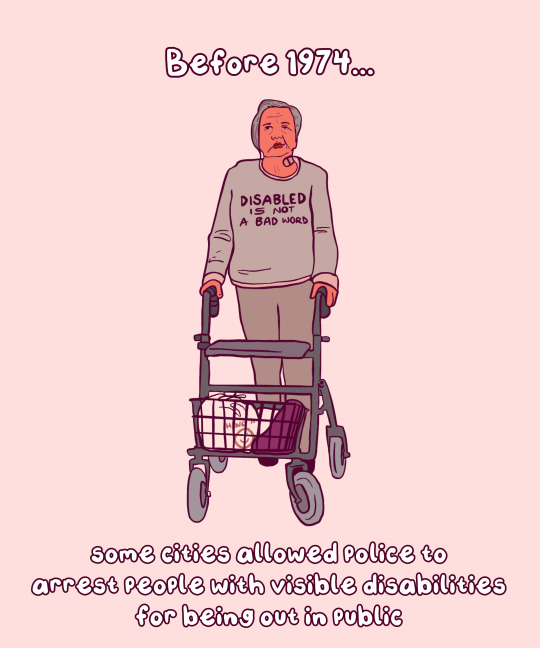
📍 In 1974, the last “Ugly Laws” were repealed in Chicago. “Ugly Laws” allowed the police to arrest and jail people with visible disabilities for being seen in public. People charged with ugly laws were either charged a fine or held in jail. ‘Ugly Laws’ were a part of the late 19th century Victorian Era poor laws.

📍 In 1976, Hawaii was the last state to lift requirements that a woman take her husband’s last name. If a woman didn’t take her husband’s last name, employers could refuse to issue her payroll and she could be barred from voting.

📍 It wasn’t until 1993 that marital assault became a crime in all 50 states. Historically, intercourse within marriage was regarded as a “right” of spouses. Before 1974, in all fifty U.S. states, men had legal immunity for assaults their wives. Oklahoma and North Carolina were the last to change the law in 1993.
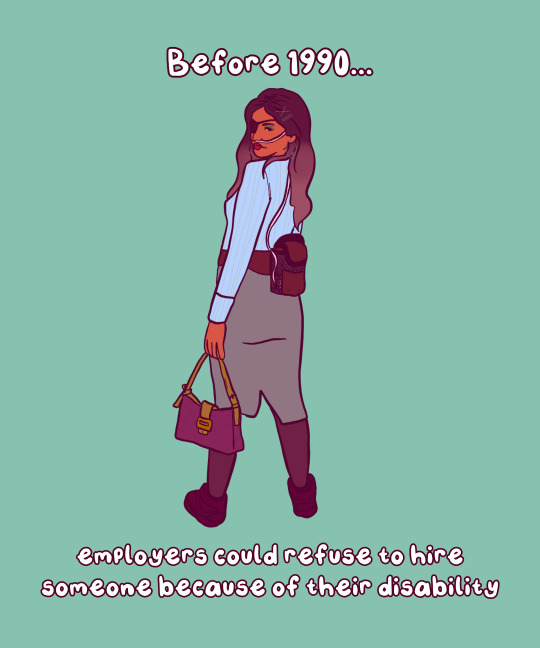
📍 In 1990, the Americans with Disability Act (ADA) – most comprehensive disability rights legislation in U.S. history – was passed. The ADA protected disabled people from employment discrimination. Previously, an employer could refuse to hire someone just because of their disability.
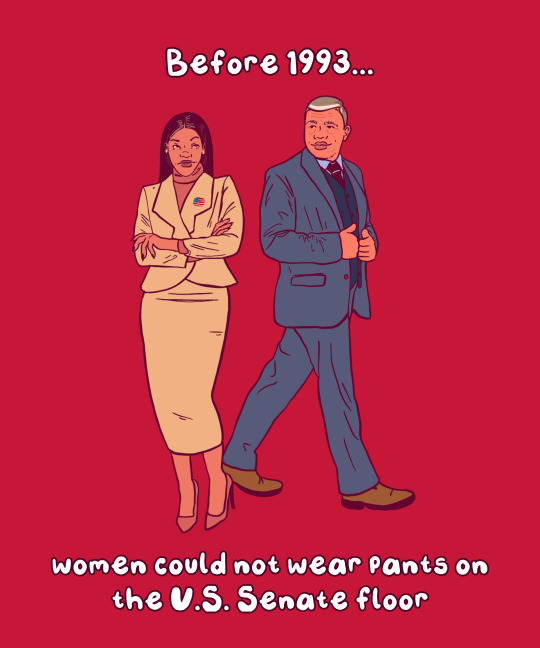
📍 Before 1993, women weren’t allowed to wear pants on the Senate floor. That changed when Sen. Moseley Braun (D-IL), & Sen. Barbara Mikulski (D-MD) wore trousers - shocking the male-dominated Senate. Their fashion statement ultimately led to the dress code being clarified to allow women to wear pants.

📍 Emergency contraception (Plan B) wasn't approved by the FDA until 1998. While many can get emergency contraception at their local drugstore, back then it required a prescription. In 2013, the FDA removed age limits & allowed retailers to stock it directly on the shelf (although many don’t).
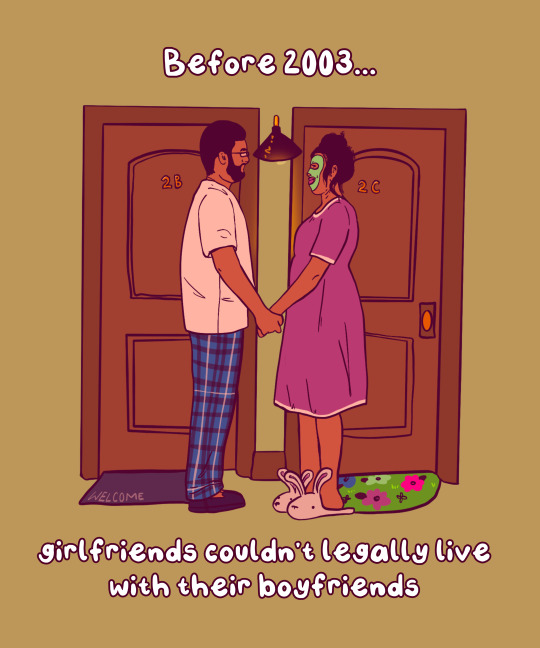
📍 In Lawrence v. Texas (2003), the Supreme Court ruled that anti-cohabitation laws were unconstitutional. Sometimes referred to as the ‘'Living in Sin' statute, anti-cohabitation laws criminalize living with a partner if the couple is unmarried. Today, Mississippi still has laws on its books against cohabitation.
#art#feminism#women's history#women's history month#iwd2024#international women's day#herstory#educational#graphics#history#70s#80s#rights#women's rights#human rights
18K notes
·
View notes
Text
ok so the other age-range poll was poorly set up by having every year in the 90's be its own individual option, and then grouping together all the decades around it
sorry if you were born before 1960 but im only allowed 12 options. feel free to comment your birth year in the replies or notes.
10K notes
·
View notes
Text
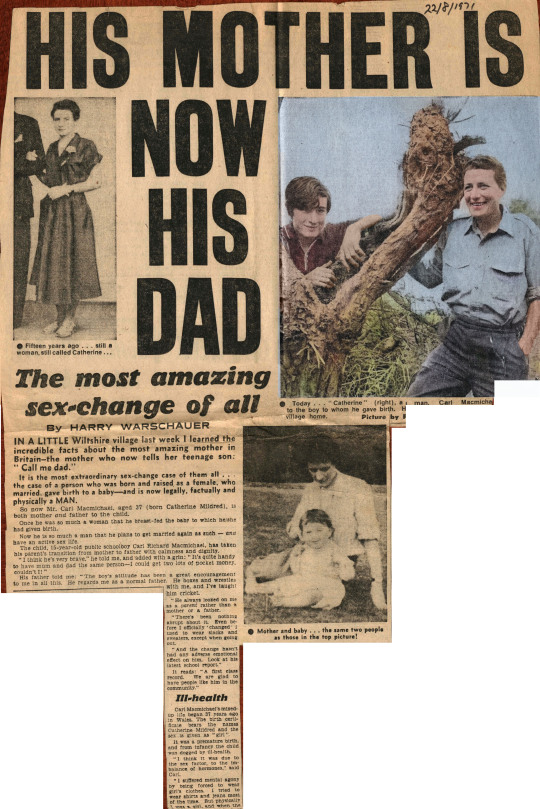

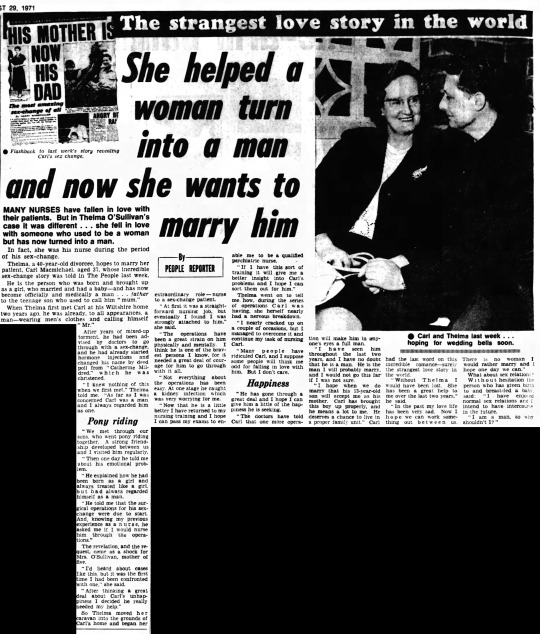
This has one of the most heartwarming historical trans stories I've ever read. In 1971, Carl Macmichael and his cis son spoke to the Sunday paper. Not only did Carl's 15-year-old son support his father, but he was delighted to have a trans dad: "I think he's very brave. It's quite handy to have mum and dad the same person."
Shortly after transitioning, Carl asked Thelma O'Sullivan to become his nurse in 1969. She helped Carl medically transition for 2 years while realizing her feelings for him. "Many people have ridiculed Carl, and I suppose some people will think me odd for falling in love with him. But I don't care," she explained. "He has gone through a great deal and I hope I can give him a little of the happiness that he is seeking."
Like most trans people at the time, Carl claimed to be intersex. Having XY chromosomes and being capable of giving birth is extraordinarily rare, leaving us to wonder if he told this to newspapers for legitimacy. All the names in the article are pseudonyms so there was never any follow-up after 1971.
4K notes
·
View notes
Text


I made a reverse au for @void-dude 's Shapes and Pines au!
Their au makes me so happy! :))) I thought it would be interesting to see them reversed. (I wrote a LOT on here so I'm going to transcribe it all at the end of this)
Honestly this was supposed to be a joke and then I kept drawing and thinking about them. This admittedly got out of hand.
To make up for it, have some Tad Strange and Bill!


Tad: Ow.
Bill: Look, Isn't it beautiful?
Tad: Bill, I shouldn't be seeing anything but a doctor right now.
(Full transcription under the 'keep reading')
1969 Tad Strange is 15 years old. (He looks old for his age and uses this to his advantage) He lost his eye in a firework accident when he was 12 and now, he has a fear of fire and a glass eye. Billium is 12 years old and is about to make a really bad mistake. His eye was missing at birth and can't get a glass eye without surgery. Their parents work together and Bills Parents asked Tad to babysit Billium when they are away to help with his bullies. They become friends. (Mini Comic 1) Billium- "You don't GET IT TAD!" Billium- "I was BORN a freak." Billium- "I can't pretend to be normal because I don't know HOW." Tad- "… Huh."
2012 Bill is a Biologist After his family home burned down, killing both Tad and Bill's families, Bill became interested (obsessed) with necromancy. He started with studying human biology, but his work hit a wall and he became desperate for more knowledge. He summoned Sixer for answers after searching for years trying to find a being that could help him. Who knew that the demon of knowledge could be so susceptible to flattery? It's probably because Sixer doesn't get summoned very often.
(Mini Comic 2)
Dr. Bill: Looking extra dexterous today Sixer~
Sixer: *AHEM* Thank you Dr. Bill, let's get back to work now.
Tad is a Car Salesmen He lives in his tow truck just in case he gets chased out of town for selling shitty cars at an increased price. He had lived alone for a long time before Bill tracked him down 4 months ago. Bill apologized and said some cryptic shit about fixing everything. Then he looked around at Tad's tow truck/home and left a paper with weird circles on it and an incantation. He said "Use this to get a better place, you'll need one soon" Then he left. Tad didn't summon Ley until 2 months ago when he almost got shot selling a fake Lamborghini to a gang leader. He was then chased out of town again.
1 Trillion years ago, Sixer and Ley were in the 2nd dimention.
Sixer created a safe(ish) portal to the 3rd dimension which he was able to do because he had one eye that saw in 3d and one that was in 2d.
Ley could see it out of the corner of his eye like Tad did, but doesn't like to look at the world beyond. He accidentally broke the portal Sixer made while trying to use it and now everyone is gone.
(Mini Comic 3)
Sixer: "Look Ley, a Shooting Star!"
Ley: "WTF is a star and why is it shooting at us?!"
#shapes and pines au#pines as shapes au#tad strange#stanley pines#stanford pines#bill cipher#my art <3#gravity falls
523 notes
·
View notes
Text
hey so. did anyone ever make the observation that we know Copia's EXACT date of birth?
The music video for Kiss the Go-Goat happens on Saturday September 13th 1969


If Sister Imperator is indeed already pregnant there, 9 months later would be May of 1970. And the game Escape The Ministry (which i feel like we all forgot about way too quickly) confirms that Copia's birthday is on May 19th (If you don't remember that game, you're playing as the renovation is happening and at the very end you find out it's Copia's birthday and you have to leave a card for him.)
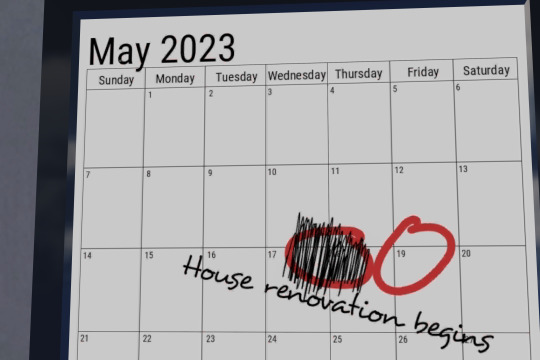
This would make Copia's exact date of birth May 19th 1970, and he is currently 54 years old.
EDIT : HEY turns out i was super wrong i did a second post about it im very sorry. tldr that date is completely false, the end of that game is not about Copia's birthday
#obviously take this with a grain of salt we know how flexible canon is#but i just thought this was interesting and i was surprised no one talked about it before#ghost#the band ghost#papa emeritus iv#cardinal copia#copia#papa iv
740 notes
·
View notes
Text
Neptune in Aries
The birth of a new world religion



"January Neptune enters Aries on March 30, but it will station retrograde on July 4, and eventually re-enter Pisces on Oct. 22, 2025. After stationing direct on Dec. 10, it will return to Aries on Jan. 26, 2026, where it will remain until May 23, 2039" (People.com)
Northopalshores' Masterlist | Midheaven Persona Chart | private readings

🐏 In the next 13-14 years we will be witnessing another rebirth around art, music, cinema, addiction & religion or spirituality as well as mental health. Everything under these areas will undergo a long-term shift. Neptune also tends to reflect what is seen as "cool" for each generation involved.
⫘⫘⫘⫘⫘⫘⫘⫘⫘⫘⫘⫘⫘⫘⫘⫘⫘⫘⫘⫘⫘
🐏 A lot more media will be put under polarizing influences as well people having clear likes and dislikes (beliefs being revisited, questioned, people arguing over their own interpretations and no longer confining themselves under outside influence).
In art, cinema or music you can expect more independent or new impactful creations brought to life (gone is the age of remakes or brands trying to relieve what they use to have or be in the past!).
🐏 New independent artists popping up, so we'll likely see the decline of nepotism going around in the entertainment industry as well. At the very least they won't exactly hold the same influence as they once did. People are prioritizing people's choice.
Not without it's problems of course (the people assuming more authority over who gets famous and for how long, being disrespectful, assuming more or equal power over celebrities, destroying boundaries once more but in a more demanding way kinda).
🐏 In a way, I think we'll start to see something similar as when Neptune was in Leo, Libra, Scorpio, Sagittarius, & Aquarius (the rise of idealistic Hollywood & celebrities, then a renewal controversial, free spirited and "wild" celebrity culture)
I wanted to include some history & the past that I'm referencing in this post to further highlight these themes & make my point clear.


💣 In Leo, late 1920s to early 1960s:
Neptune was in Leo starting around late 1915 untill early 1929 & then in Libra starting late 1942 untill early 1956 (also retrogrades between Virgo & Scorpio throughout that time).
We saw the rise of Hollywood and a monopoly over media and & movie screening rights or "block booking" (forcing theaters to buy bundles of films including low-quality ones if they wanted to show the hits) to ensure their profit & movies of choice would be shown. Major movie theaters i.e Warner Bros, MGM & Paramount controlled the film distribution.
Celebrities were considered royalty and were treated with adoration, often idealized and sold as such through the media. They were literally "stars" and their lives were viewed as luxurious, classy and to die for in some cases. They were icons and representation of culture, power and elegance. In a way, they were treated as products. It was also common for them to put up fronts to make themselves seem more desirable and polished than they really were. Ugly aspects of their lives were kept hidden to continue selling that star image. That norm began to shift following Neptune in Scorpio (late 1955 - 1970).
💣 In Scorpio, 1955 - mid 1970:
Neptune moved into Scorpio. Consequently we saw the rise of rebellion & dark themes in media. Characters became more raw, and unfiltered but in a meaningful way. There was also a striking increase in sexual portrayal through songs, movies and art. Horror saw a rise in popularity as well. Think Rebel without a cause (1955) & Psycho (1960). Both iconic for stirring the pot in their own way. We also say a rise in counterculture & anti established themes in media (focused on the antihero) like in Bonnie & Clyde (1967) and Midnight Cowboy (1969 nice), and even in movies like The Graduate (it rubbed me the wrong way when I first watched it but that was literally the point; sexual disillusionment in a way). This era reconstructed the media making people question authority figures, and questioned morality in the process. Being the first to push boundaries and limitations.
💣 In Sagittarius, 1970s-1980s:
Neptune moved into Sagittarius early 1970 until 1984 then continuing into Aquarius in the late 90s. (Retrogrades between Capricorn throughout that time).
Here, we enter the "new wave" of media, through music and movies especially. Hippie culture and religious/spiritual practices also became more popular during this time. We saw the birth of "wilder" films and concept leaning into creativity, sci-fi, overindulgence and hedonism. Movies, media, & music became more widespread and available as there were more options and genres to choose from ( we saw the rise/birth/popularization of punk rock, hip-hop, heavy metal, reggae, electronic, funk & etc). Although there was still controversy surrounding media control (like studios & labels having power over their artists, them having to lip sync and filter a lot of the media, radical religious movements also took place to oppose the rise of that new age hedonism). Also, it was considerd cool not to care and have that laid back attitude amongst the younger generation of the time.
💣 In Aquarius, late 1990s to 2011:
Neptune entered Aquarius in 1998 untill late 2011 (retrogrades between Capricorn & Pisces throughout that time).
The internet really came down hard on people during this time and celebrities were considered public domain to be consumed and criticized. People wanted to be famous, but often became so through some sort of problematic (yet new & exciting) ways. Not giving a fuck was popular. Being problematic was popular.
A lot of people were jerks during this time and treated celebrities as such, often going for shock factors and stirring up controversy in any industry really. People were rather judgemental of each other but at the same time this is where we saw the popularization of individuality expressed through bizzare or standout aesthetics. We also saw the birth of revolutionary public figures, film & media and celebrities like Lady Gaga.
At the same time, South Park, the MTV craze, the whole Britney Spears controversy, Eminem, 4chan, obscure websites and internet icebergs, all of them were born or popularized during this time for having that jarring or rebellious ("cool & niche") aspect to it. The weirder or unhinged you were, the more you were seen. Controversy seemed to rule the online world in a way. Indie games (and games in general ) were also a dominating presence back then. People were kind of out of touch too following that plunge into Neptune in Pisces.
I read a reddit post about it here and honestly, I agree with what they were saying as it was evidently so especially online.
Here's a chart timeline of Neptune in the signs (including it's retrogrades from 1901-2026 from cayelincastell.com)


So to continue where we left off with Neptune in Aries:
🐏 Celebrities will no longer be worshiped but they will still have power over the world (just not the same way that it is now where boundaries are questioned). They'll be more expressive and experimental, abrasive even (claiming their right as individuals and not products to be scrutinized by the public or people online). Think Chappelle Roan advocating her rights and fighting back against disrespectful media representations being more rude. Same with Doja Cat and her whole rebrand (while it may have upset many of her fans).
🐏 Celebrities won't act like they owe anyone anything anymore but people will also start revolting against their influences. So we can expect more altercations surrounding that area as well.
🐏 Celebrity hate or drama could be amplified.
We'll likely see the rise of more masculine influence in art, movies, music, religion & spirituality. More men diving into Neptunian themes including music, religion or the occult (astrology, witchcraft & tarot). Idolizing powerful men or public figures.
🐏 Births or the appreance of "prophets" could be possible.
🐏 Independent brands gaining more traction & popularity.
🐏 Prominent activism.
🐏 Idolized brands going through rebrands or losing worth.
🐏 Women embracing a more agressive and powerful presence. People with significant Aries placements may be impacted significantly too (triggering a lot of inner fears or desires but also their creativity).
🐏 Movies could center around new & impactful stories, based on true events, more action, more drama, a reformation through the narrative or overall vibe of movies or animations, we may also see a rise in independent films again or maybe even movies that kind of suck ass or are straight up just "shocking" but get popular over that.
🐏 Movies that are hot & heavy, action packed or just something more real or raw (like live action and physical sets).
🐏 People may be less dependent on religion as well & instead will be focusing on individuality and personal power (which can be both good & bad depending on the context).
🐏 There may be conflict with certain religions (being stubborn or assuming power over the other) that part might be rather messy, but it's to be expected.
🐏 Agressive idealisms & false crusades (fighting for religious beliefs that are misleading).
🐏 Media or delusions being our reality.
🐏 More internet fights or calling people out, being more confrontational. Some sort of war or huge conflict may start as well. The last time Neptune was in Aries, the US went through Civil War.
🐏 People will respond more to power and authority (rather than spirituality, authoritarian figures will likely dominate this era). There's likely going to be some forcefulness at play as well. But rebellion, and stubbornness is more significant (especially since Pluto is in Aquarius).
🐏 Intense psychological battles will also ensue. Mayhaps many, many rude awakenings.
🐏 Neptune in Aries & Pluto in Aquarius is a lethal combination. Hah, expect more discourse online. Seems like a good part of the world is turning into a worldwide "Reddit", people correcting one another & putting their interests, ideas, and expressions above others. Either way, this new era is not for the weak or faint of heart. Brace for impact soldier!
Overall themes: War, independence, serving c*nt, body horror, death, stubbornness, arguments, wild & free experimental decisions, s*x, energy, power, drama, visceral emotional outbursts, things feeling real & consequential, contant taking (less giving).
This was my personal forecast for Neptune in Aries based on the prior evidence we had & measuring changes that i. occured
˚₊‧꒰ა paid readings available ໒꒱ ‧₊˚


Signing out,
@northopalshore
#neptune in aries#Neptune transit#astrology blog#astrology notes#astro notes#astrology observations#astro observations#astrology content#astrology#astrology community#astrology ramblings#celebrity culture#internet culture#entertainment industry#transit astrology#transit charts#transit chart
183 notes
·
View notes
Text
1968 [Chapter 11: Hephaestus, God Of Fire]

A/N: Only 1 chapter left!!! 🥰💜
Series Summary: Aemond is embroiled in a fierce battle to secure the Democratic Party nomination and defeat his archnemesis, Richard Nixon, in the presidential election. You are his wife of two years and wholeheartedly indoctrinated into the Targaryen political dynasty. But you have an archnemesis of your own: Aemond’s chronically delinquent brother Aegon.
Series Warnings: Language, sexual content (18+ readers only), violence, bodily injury, character deaths, New Jersey, age-gap relationships, drinking, smoking, drugs, pregnancy and childbirth, kids with weird Greek names, historical topics including war and discrimination, math.
Word Count: 5.4k
Let me know if you’d like to be tagged! 🥰
💜 All of my writing can be found HERE! 💜
Here is our final interlude. Do you have the patience?
President Lyndon Baines Johnson has halted all U.S. attacks on North Vietnam: no bombs from the air, no infantry on the ground, no artillery shells launched by destroyers cruising in the South China Sea. The election will determine what happens next. If Nixon wins, military operations will resume until the South Vietnamese are in a sufficiently advantageous position to defend themselves from the communists. If Aemond is the victor, troop withdrawals will begin shortly after he is inaugurated on January 20th.
Regardless, it will not be until almost a full year from now, in October of 1969, that it becomes illegal for employers to reserve positions for men; the common practice of refusing to hire women with preschool-aged children will not be outlawed until 1971. Unmarried people will not be guaranteed access to contraception until 1972. Abortion will not be legalized across all fifty states until 1973. Women will not have a right to their own bank accounts or credit cards until 1974. It will not be illegal to exclude women from juries until 1975. The first female Supreme Court justice, Sandra Day O’Connor, will be appointed in 1981. There will be no female president of the United States, not for at least half a century after our story ends.
Each night on CBS Evening News, Walter Cronkite recaps the latest poll numbers. Nixon appears to have a slight advantage, due in large part to pulling ahead in Florida, Illinois, Ohio, and his home state of California. Aemond has comfortable leads in Texas, Pennsylvania, New York, and New Jersey. George Wallace will likely sweep the Deep South: Georgia, Alabama, Mississippi, Louisiana, and Arkansas. From their hovels, the racists rejoice. From her grave, Lurleen Wallace rests uneasily, scratching at the lid of her coffin with the bones of her fingers, entombed in dark oblivion like all the rest of the world’s discarded wives.
~~~~~~~~~~
You go for the door, but Aemond is faster; he catches you just as your hand is twisting the handle and the hinges creak. He throws you against the wall so hard the paintings rattle: replicas of Monets and Warhols, Almond Blossoms, The Birth of Venus. You fight, clawing at him, ripping off the eyepatch that Alys must have at last convinced him was no defeat to wear. The hollow, gore-colored abyss of his left eye socket beckons you to fall in and be burned: Hestia’s eternal hearth, the volcanic forge of Hephaestus. He’s fire all the way down, hunger and fury, bones charred black and brittle. You think of the uninhabitable furnace of Jupiter’s moon Io, lethal radiation, poisoned air, lava bubbling up like blood through a bullet wound.
“You can’t hit me,” you gasp. “You need me for photos—”
His knuckles are in your belly, crosshairs made of scar tissue. The air collapses out of your lungs; your vision dims like twilight, like an eclipse. You’re on the floor and trying to crawl away from him. Aemond’s fingers hook into the fabric of your robe; it matches the silk nightgown you wear beneath, a pale anemic pink, something soft and young and desireless, something eternally at others’ mercy, something to be guarded or gutted. He’s dragging you towards him.
He’s going to hit me again, he might even kill me.
“Stop, stop,” you plead, still struggling to breathe. “What if I’m pregnant?!”
You almost certainly can’t be, but Aemond doesn’t know that. Yet his lone eye glints like metal, like coins, no weak mortal compassion. “I would have no way of being sure it was mine.” And then he tries to cover your mouth as you scream for help. You bite at his fingers; your bare feet kick the wall. Your hair, long and loose and wild, flows around you like a bride’s veil.
Too late, Aemond realizes that the door is still open a crack from when you grabbed the handle. There are footsteps and a voice that crescendos as it approaches: “What on earth is going on in here…?” Fosco appears in the threshold, yellow tweed jacket, tight olive green trousers. He stares thunderstruck down at where you and Aemond are entangled on the floor.
You beg: “Fosco, help me.”
“No, no, no,” Fosco says, jolting from his paralysis and holding a hand out towards Aemond. “No, you cannot do this, whatever has happened, you cannot touch her like—”
“She’s not your wife,” Aemond says. She’s not your property. Fosco hesitates; his large dark eyes shifting between the two of you from behind his glasses.
“Aemond, brother, listen to—”
“Get out.” Aemond’s voice is low, searing, malignant.
“Fosco, please don’t leave me,” you whimper. You try to pry Aemond’s fingers off your robe; they dig in deeper, bruising the flesh underneath. “Don’t leave me, don’t let him hurt me.”
Abruptly, Fosco turns and sprints out of the room.
“No!” you shout after him before Aemond grabs your face, his hand like a claw, fingernails leaving half-moon indents in your cheeks, crushing pressure on your jaw.
“You’re trying to sabotage this campaign.”
“I didn’t see the reporters, I swear to God.”
He knocks the back of your skull against the wall so hard that you see momentary flashes like stars, that all the words vanish from your throat, that words cease to exist at all. “You’re a traitor. Do you know the penalty for treason? The U.S. Army would have you executed by firing squad. Zeus would chain you to a rock so your liver could be carved out.”
“You betrayed me first,” you hiss through clenched teeth, your head pounding hot and maroon.
“I have been working for this since before you were born. You can’t take it away from me. I won’t let you.”
“I did everything right and you still couldn’t love me.” You swing at Aemond and he catches your wounded hand, squeezes it, digs his thumb into the spot where the doctors stitched you closed. The pain is excruciating, incapacitating. You wail as scarlet flowers bloom through the white of your bandaged palm.
Now the door flies open again and Aegon collides with Aemond, sends him sprawling, crouches over you. He’s screaming something at Aemond, gripping your shoulder to keep you under him, his too-long hair hanging in his face, black turtleneck sweater, one of Daeron’s frayed army jackets thrown over it, ripped jeans, bare feet. Aemond grabs his brother by the lapel of his army jacket and draws back his fist. His golden wedding ring flashes in the grey November sunlight that streams in through the windows. Aegon doesn’t flinch. He’s taken knuckles to the face before; you remember cleaning blood off his skin under a streetlight in Biloxi, you remember not wanting to wash him away.
“Don’t you see what it will look like?!” Fosco is saying, trying to coax Aemond to relent. “If he is photographed with a busted face after that story comes out? If she has bruises or a black eye? By harming them you are confirming what your enemies have printed, and the voters will believe it is the truth.”
“They already know it’s true!” Aemond snatches the Wall Street Journal off the table and hurls it at Fosco. Then he paces back and forth through the room, glaring at where you are still crumpled on the floor, sobbing, cradling your bleeding hand to your chest. “It’s right there, three goddamn photographs, and that’s all it will take to bring down a lifetime of work!”
Fosco studies the pictures again, shaking his head, one hand covering his mouth. At last he offers weakly: “It could be worse, Aemond.”
“How could it be worse?!”
Aegon scrambles to Fosco to rip the newspaper out of his hands, then returns to you. He hasn’t seen the front-page story yet. He skims it frantically. “This? This is what you’re losing your mind over? It’s dark, it’s blurry, they can’t even see what’s going on!”
“I have one fucking eye and I can see it!”
“So come up with another explanation, this doesn’t prove anything.”
“If she costs me the election—”
“If you lose, it won’t be because of her!” Aegon roars back. “It will be because the Democrats have held the White House for eight years and the world has gone to hell on our watch, it will be because of Kennedy, and Johnson, and Vietnam and the riots and the hippies and the drugs and the assassinations, it will be because Nixon is promising law and order in a time when nobody is safe, it will be because you just weren’t good enough. But she has given more to your cause than anyone. You hit her and you’ll lose your other eye.”
“They were in conversation,” Fosco says, meaning the photos. The four of you know that’s not true; it is a lie for the rest of the world, it is hope for Aemond’s campaign. “On the beach. They were whispering, comforting each other. Because of Mimi. That is all.”
Aemond scoffs, his remaining eye fierce and wrathful as it lands on you again. Aegon grips your shoulder, still crouching over you, still shielding you. “You bitch. I should have left you at that party in Manhattan to be the dope-smoking whore you were when I found you.”
“I shouldn’t have helped save your life in Palm Beach.”
And Aemond blinks at you, not hurt but bewildered, like he doesn’t understand your words, like what you said is impossible. He doesn’t believe you saved him. He believes it was God’s will.
Otto storms into the hotel room and takes in the scene: you and Aegon on the floor, Aemond pacing furiously, Fosco attempting to mediate. “Nobody says anything,” Otto commands, deep booming voice, black suit like he’s going to a funeral. “The Wall Street Journal hates Aemond. Everyone knows that, they’re probably the only national publication that would run the story. Our newspapers are already pushing the counternarrative, that this was a shameful, deceitful, desperate attempt to discredit Aemond right before the election. Our supporters will insist upon an innocent explanation. Nixon’s will use the photos as evidence of our degeneracy, our amorality, us immigrants with our strange faith and our progressive politics. Everyone else in the country will be warring over this headline. We will say nothing. We will conduct business as usual. The best thing we can do now is go out there and keep our schedule as planned.” He looks meaningfully at Aemond. “And your wife must be at your side. Smiling, unscathed, devoted.”
“I lost my composure,” Aemond says to you, more collected now, businesslike. He is smoothing any wrinkles out of his suit jacket. “I was wrong to put my hands on you. I apologize for that. It was beneath me.”
You reply: “Very little is beneath you, I’ve learned.”
“You have been.” A trace of a grin, crooked and cruel. “Plenty of times. And you will be again.”
Aegon is watching is brother, seething but terrified, sheltering you with power that is only illusory, never real. It is a mirage that Aemond or Otto could punch through at any moment. It is glass that would shatter into crystalline dust.
“If I win, you will beg on your knees for forgiveness,” Aemond tells you. “You will beg in private, you will be perfection in public, and I will magnanimously overlook this indiscretion in which you were taken advantage of by my notoriously dissolute brother. There was no affair. There was a fleeting moment of weakness on your part and depravity on Aegon’s. We will put it in the past. I will be the president of the United States and you will be my first lady. You will spend every second of your existence in service of my career, my country, and my legacy. You will give me children. You will obey me entirely. And you and Aegon will never be in a room alone together for the rest of your lives.”
“You can’t keep me away from her,” Aegon says.
“I just did. I make the rules here, I am the heir to this empire. If you wanted that responsibility, you should have seized it. You squandered it, you cursed it. It’s mine now.”
A whisper: “Aemond, it’ll kill me.”
“Then have the dignity to die quietly. It will be the most useful thing you’ve ever done.”
“Aegon must be seen in public too,” Fosco says, trying to sound like he isn’t defending him. “If you appear to be punishing or excluding him, it will be used as evidence of his guilt.”
Aemond nods, then turns to his brother. “As soon as the election is called, whichever way it goes, I want you gone. I don’t care where you go. I don’t care what happens to you once you’re there. You will disappear. We will say it was your choice, and if you comply you can keep your children and receive a modest amount of severance pay to get you started. And as long as you abide by my terms, my wife will not be harmed.”
Aegon doesn’t reply. His large Atlantic-blue eyes glisten, his lips tremble, his hand is still on your shoulder. You think through the throbbing pain of your bleeding palm: Is this the last time he’ll ever touch me?
Otto grabs Aegon, wrenches him away from you, drags him yowling and clawing at the carpet through the doorway.
~~~~~~~~~~
Your hand is freshly bandaged, pristine white gauze that people in the crowd jostle to touch like the relic of a saint, to pray over, to kiss. Men tell you how brave you are to bear the pain without weeping. Women give you komboskini, stained not with their husband’s blood but with only the clean, colorless ether of hope, faith, reverence, love.
Fosco and Helaena have been dispatched to accompany the children on a tour of the Franklin Institute, one of the oldest centers of science education in the nation. Aemond is giving a speech in front of the Liberty Bell at Independence Hall. You and the others are arranged around him like a starving crescent moon. You are standing immediately on Aemond’s left side, Aegon placed at his right. He looks drunk, he looks drugged; you aren’t sure if anyone else can tell, but you can. His cheeks are flushed. His eyes are pools of murky, desolate indigo like the night sky between stars. A few attendees give the two of you curious glances, but no mention is made of the accusations in the Wall Street Journal. You get the sense that if someone took it upon themselves to ask a question on the subject, they would be jeered, reviled, banished like President Johnson, who is currently besieged in the White House by the ghosts of Vietnam.
When you look to Aemond, you see his scar, his prosthetic eye, fierce and stoic determination in the lines of his face. He is quoting the inscription on the bell: “Proclaim liberty throughout all the land unto all the inhabitants thereof…” The bronze metal has a crack in it like one of Zeus’s lightning bolts. The smile on your face is frozen, demure, humble. Aegon’s eyes accidentally catch on yours—a childlike vulnerability, a deep raw woundedness—and then swiftly dart away.
“America is the Land of Opportunity, but some have forgotten that,” Aemond says into the microphone, and vengeance creeps into his voice like a spider up a wall. “Unfortunately, for as long as new communities have arrived at our shores, vile and prejudiced lies have been used to demonize them. Greek immigrants have been crossing the Atlantic for over a century. In 1909, rioters violently expelled them from Omaha, Nebraska. In 1922, an anti-Greek initiative was launched by the Ku Klux Klan. In 1924, Congress drastically restricted my people’s entry in favor of migrants from Northwestern European nations like Britain and Germany. Greeks have been condemned as unintelligent, immoral, and unworthy of the glorious opportunities of this country. We have been barred from jobs and universities, we have been used as cannon fodder in the World Wars. Discrimination against any group is antithetical to the American Dream. I have given an eye for this nation, my wife has bled for it, my brother has—even in the midst of personal tragedy—uprooted his life and the lives of his children to fight alongside me for a better America, and I will not stand by silently as the Targaryen name is tarnished by bigoted falsehoods…”
Now you can no longer hear him over the thunder of the applause, and you remember all the other faces in all those other cities, their eyes illuminated as if by fire, as if by the sun. You imagine devotees of the Greek gods bowing low in temples of white marble and flickering torches, bringing offerings of gold and livestock, grain and blood, murmuring prayers, bargaining for miracles. Did the gods hear them? Do the gods love anyone but themselves?
Alicent and Criston are watching you and Aegon with the same eyes: large, dark, shimmering, a curious combination of horror and profound sympathy. You can feel yourself becoming a ghost, a legend, a myth. One day people will read about you in textbooks and academic journals, in plaques erected at Aemond’s alma mater, Columbia University, and your own, Manhattanville College; and they will know only the fabled version of you. Who you really were will fade into nothingness like Echo, like Icarus into the waves, like Eurydice when her lover Orpheus dared to glimpse back at her.
That night in your penthouse suite at the Ritz-Carlton, you get out of the bathtub—dewy with steam, donning your pink robe—and then go to your side of the king-sized bed and slide open the top drawer of the nightstand. The card Aegon gave you at Mount Sinai isn’t there. Your heartbeat quickens; your stomach lurches.
“What…?”
You get down on your knees to reach into the back of the drawer, to see if the card has snagged somewhere. You hear footsteps and whirl to see Aemond standing in the doorway between the bedroom and the living room. He is holding the card. The cartoon cow beams jubilantly at you. You recall what Aegon wrote inside after crossing out the manufacturer’s message: I thought this was blank…congrats on the new calf! As your eyes widen, Aemond rips the card down the middle.
“Don’t!” you scream, rushing for him. “Please don’t, it’s all I have from—!”
Aemond shoves you back and then, with a grin more like a wolf baring its teeth, tears through the remnants again and again until the card is nothing but shreds. He opens the sliding glass door that leads out onto the balcony and throws them into the cold night wind, where they scatter in a flurry like snowflakes, like bones turned to splinters by cluster bombs in the swamps of Vietnam.
The paper fragments spiral down thirty stories towards the zooming headlights on South Broad Street, and you think about following them. Then Aemond pulls you into his arms as frigid air blows through you and whispers: “You don’t need Aegon anymore. You just need me.”
~~~~~~~~~~
It’s Monday, November 4th, and you are walking alongside Ludwika on Broadway in Astoria, Queens, the part of New York City known as Greektown. She chats about the modelling jobs she did here before meeting Otto, her Louis Vuitton stilettos clicking on the sidewalk, her Camel cigarettes smudged with red Yardley lipstick. It is an act of kindness; she is trying to distract you. A few yards away, Fosco is telling Aegon about how he just won $500 by betting on the NASCAR Peach State 200, held at Jefco Speedway in Georgia. Aegon nods along, preoccupied, miserable. He has dark shadows around his eyes and is smoking one of his Lucky Strikes. He is wearing a green knit cap, windblown curls of his blonde hair escaping from underneath. You’re not supposed to stare at Aegon, but sometimes you can’t help it. You miss him. You’re worried about him.
The Targaryens have suites reserved at the Plaza Hotel in Manhattan, where the family will stay through Election Day to witness the results as they are tallied on the evening news. The children are there now, enjoying pizza from Little Italy with Helaena and the nannies. But you and the other adults are being photographed by flocks of journalists as you head for lunch at one of the oldest Greek diners in the United States, paying homage to Aemond’s ancestry. The candidate himself is locked in a fraught conversation with Otto and Criston: polls gaining here, polls slipping there, Nixon inching further ahead in Florida, the state you were supposed to help Aemond win.
“What should I order?” Ludwika asks you. “Not spinach pie, oh, horrible, worse than Hitler. Something else. Why can’t we go to a Polish restaurant for once? I will take you sometime. You will see. You will try a pierogi and never look back. We invented bagels, you know.”
“Beagles?” Fosco says. “What an accomplishment! They are so cute!”
“Bagels, stupido.”
“Do not bully me. I am suffering too. I should be back at the hotel eating a prosciutto pizza.”
As you pass an electronics shop with stacks of televisions in the windows, all turned to NBC news, the journalists begin to gasp and chatter excitedly amongst themselves. The flashbulbs strobe madly, shutters clicking and reporters shouting for Aemond to give them a comment. The youngest Targaryen brother has appeared on the screens, bruised and gaunt and missing teeth. He looks twenty years older than he is. His once-golden hair is turning white.
Otto sputters: “What…what the hell is that?!”
“Oh my God, Daeron!” Alicent howls, and then bursts into the shop so she can hear what her lost son is saying. The rest of you hurry after her, locking the front door behind you so the journalists can’t follow. Through the windows, they take photographs until Fosco and Ludwika lower the blinds.
Inside the maze of electronics, three adolescent employees gawk at the presidential candidate and his retinue. “Out,” Otto instructs them, and then, when they are too stunned to immediately vacate the premises: “I said, get out!” The teenagers scurry into the backroom and slam the door.
“Daeron,” Alicent moans in front of a Zenith color television. Tears flow torrentially from her huge, horrified eyes. Criston holds her, arms circling, his cheek pressed to hers, and you are reminded of how Aegon touched you in your hotel room in Houston, in his basement at Asteria, on the shores of the Atlantic Ocean.
Daeron is saying: “The United States has committed war crimes in Vietnam. I am ashamed of the actions my country has taken here. We have burned children with napalm, executed innocent civilians, and interfered in matters that we have no legitimate jurisdiction over…”
“He is reading from a script,” Fosco says. “You can see his eyes following the words.”
“Shh,” Otto snaps.
Daeron continues: “The only honorable course of action now is to immediately withdrawal all American soldiers from Vietnam…”
“I think this will help us, actually,” Otto says. “People will know he’s being forced to make propaganda for the communists, and they will have sympathy for him and the family. They’ll want to rescue him and all the other servicemen too. He’s obviously…under duress.”
Aegon drops to his knees and puts his palm against the screen over Daeron’s face, just like the shadows of your fingers once fell over Ari as he fought for his life in an incubator in Mount Sinai Hospital. “Do you see what they’re doing to him?” He turns to Aemond with tears in his eyes. “What you did to him? You left him there, you abandoned him, and now he’s being tortured.”
Alicent looks to Aemond, puzzled, petrified. “You tried to get him out, didn’t you?” Aemond doesn’t answer. Otto averts his gaze, counting the tiles on the floor.
“Dear lord,” Ludwika mutters, lighting a fresh Camel cigarette and puffing on it anxiously.
“Was it worth it?” Aegon demands. “Selling your soul?”
Aemond is steely, resolved. “It’s almost over.”
“You were all right.” Aegon stands, wiping his eyes with the sleeve of his green-striped sweater. “I don’t have what it takes to win the presidency. I couldn’t do something like this. Me, the perennial fuckup. Me, the godless degenerate.”
“Aegon,” Alicent whispers. “Please…please don’t…”
He turns to his mother, insurmountably sad. “Mom, I tried to stop him.” Alicent sobs and covers her face with both hands as Criston embraces her. She can’t even look at Aemond. She can’t believe what he’s become. Her long coppery hair flows like blood.
You reach for Aegon, your fingertips brushing his ruddy cheek, and immediately he folds into you, burying his face in the curve of your neck, breathing in your warmth as you inhale his smoke and rum and pain and terror. “Daeron will be home soon,” you say, not knowing if it’s true. Your bandaged hand aches; your throat burns.
“I should have gone instead. It should have been me.”
“No, Aegon. Your children need you, I need you. I wouldn’t have made it without you.”
Then Aemond yanks you away, his grip on your wrist like an anchor, like chains.
~~~~~~~~~~
“Dad, play us something,” Orion says; and it is the first time you can remember him calling Aegon that. Aegon smiles. He’s sitting on one of the couches in the penthouse suite you share with Aemond, the Gibson guitar he bought back in July lying across his lap as he strums it absentmindedly. The television is on and turned to CBS News. It’s just before midnight on Tuesday, November 5th, Election Day. The children are thrilled. It’s the one night they’re allowed to stay up as late as they’re physically able to. This allowance is not purely altruistic; Aemond wants them awake and ready for photographs as soon as the winner is announced.
“What should I play?”
“Frank Sinatra,” Fosco says. He is beside Aegon on the couch, smoking a cigar and flipping through the Sports section of the New York Times, which he’s not really reading.
“Marvin Gaye,” Ludwika suggests. They are both on your side of the room. Aemond, Otto, Sargent Shriver, and a number of campaign staffers are huddled around the television, transfixed by the ever-updating vote totals. Alicent and Criston are between your factions, murmuring back and forth to each other, flutes of golden champagne in their hands. Helaena is on the floor entertaining Violeta, Daphne, and Neaera with Crayolas and coloring books full of scenes from gardens. You recall how eerily calm Helaena had been the night Aemond was shot in Palm Beach, like she somehow already knew he’d survive. Now she is nervous, looking fretfully around the room, wringing her hands, filling outlines of butterflies with ten different shades of blue.
“The Beatles,” Orion tells Aegon, casting Fosco and Ludwika a judgmental teenage glance.
“Any particular song?”
“You can pick.”
Aegon sips at his rum, ice cubes clinking in the glass. He looks over to the coffee table, where you are embroiled in a game of Battleship with Cosmo. He’s getting better; he’s genuinely sunk your destroyer and submarine so far. Then Aegon’s eyes drop to his guitar strings and he plucks the opening notes of In My Life. His voice is soft and low, almost secretive.
“There are places I’ll remember
All my life, though some have changed
Some forever, not for better
Some have gone and some remain…”
Cosmo turns to watch his father. Orion, Spiro, Thaddeus, and Evangelos are gathered around Aegon’s feet, gazing up at him with admiration, with love.
“All these places had their moments
With lovers and friends, I still can recall
Some are dead and some are living
In my life, I’ve loved them all...”
Cheers erupt over by the television; Aemond has just won Michigan. But then tense, indistinct deliberations follow. Florida is still too close to call, a bad omen. You wonder where Alys is as she watches the results come in. There must be some part of her—however small, however smothered—that fears Aemond will win. If he captures the presidency, she could be separated from the man she loves for the better part of a decade. You drink your Pink Squirrel, wishing it was stronger. You think of sea sponge divers down in the depths and imagine what that first gulp of air tastes like when they resurface, when they shed their rubber suits and brass helmets and step back into sunlight, warmth, freedom like Persephone returning from the Underworld each spring.
“But of all these friends and lovers
There is no one compares with you
And these memories lose their meaning
When I think of love as something new…”
You wear a sapphire-colored gown that Aemond chose for you, strings of silver around your wrist and throat, diamond teardrops hanging from your ears. Your hair is up, your fingernails painted a tasteful opalescent shade, the aching of your bandaged hand dulled by booze and Vicodin.
“Though I know I’ll never lose affection
For people and things that went before
I know I’ll often stop and think about them
In my life, I love you more.”
More triumphant shouts and applause across the room by the television: Aemond has won Washington state. From his own suite at the St. Regis Hotel a few blocks south on 5th Avenue, Nixon’s people must be celebrating that he just secured Ohio’s 26 electoral votes. He needs 270 to be the next president of the United States.
Florida, you think. If Nixon can take Florida, I think he’ll win the whole thing.
As Aemond and Otto are distracted, as Fosco and Ludwika watch with pitying, knowing eyes, Aegon sets his guitar aside and walks by you with his rum in hand, taps your shoulder, disappears onto the balcony. You wait a few minutes—Cosmo wins Battleship and goes to color on the floor with Helaena—and then follow Aegon.
Outside the night sky is moonless, starless, thick with clouds. Rain is beginning to fall, soft hushed pattering. Far below taxis and limousines are still rushing and blowing their horns on West 59th Street. You can see the vast forested shadow of Central Park and streetlights like constellations. In apartments and office buildings, windows are illuminated as Americans sit numbing their fears with beer, wine, shots of liquor, smoldering hand-rolled joints.
Aegon is cross-legged at the ledge, one hand on the iron bars of the railing, staring out at the nightscape of Manhattan. His hair lashes in the cold November wind. His nose is pink, his eyes wet and faraway. He passes his Lucky Strike cigarette to you as you join him and says: “I don’t think Aemond can win without Florida.”
“No,” you agree, taking a drag.
Aegon snatches a rattling orange bottle from the pocket of his olive green army jacket, pops it open, and swallows three pills with a swig of straight rum, dark amber poison.
“Don’t do that,” you say, you plead.
“I need it, babe.”
“I want you to still be alive in ten years.”
Aegon smiles and reaches over to pat your cheek twice. “I think that ship might have sailed, little Io.” Can decades of self-destruction be undone, uninflicted, nullified like Heracles becoming immortal? Can the Underworld be escaped? “Come with me. No matter what happens tonight.”
“Aegon, I can’t.”
“I’m in love with you.”
“If I leave, he’ll hurt you. He’ll hurt me worse.”
“It’s not fair,” Aegon says, his voice breaking.
“Nothing is.”
There is an uproar inside the hotel room, screams that could be horror or triumph, realized dreams, breaking bones, bullets through flesh. You and Aegon are on your feet, hauling the balcony door open, stepping through the threshold into the rest of your lives.
Glasses are being toasted until champagne rains down onto the carpet. The telephone is ringing so Nixon can concede. On CBS News, Walter Cronkite is reporting that Aemond has won Florida and thereby accumulated 270 electoral votes. The blue text on the screen reads: Senator Targaryen will be the 37th president of the United States.
#aegon ii targaryen#aegon targaryen#aegon targaryen ii#aegon ii#aegon targaryen x reader#aegon x reader#aegon ii x y/n#aegon ii x you#aegon ii targaryen x reader#aegon ii fanfic#aegon ii x reader#aegon ii fic
283 notes
·
View notes
Text


Only one date is ever mentioned in-game, that being 2021. Considering that the Virtual Singer Fan Festa seems to be a stand-in for Magical Mirai 2021, we can assume that the Scramble Fan FESTA! event takes place in September 2021 (the real-life MM2021 was delayed to November due to covid-19, but the pandemic doesn't exist in-universe and MM Tokyo usually takes place at the beginning of September). There are Leo/need Daily Life social media posts that show them attending Magical Mirai, and do state the year of the event, but these can be considered promotional material for the event itself rather than canon material, especially since the characters address in-game that only one year has passed since the start of the story (despite the fact they have celebrated new year's day 4 times now. Timeloop things).
Based on this date, we can actually place exactly when every main character was born. The cutoff date for Japanese schools is April 1st, making Ena the oldest main character, being a 3rd year with a birthday of April 30th, followed by Tsukasa on May 17th, so on so forth all the way down to Kohane, a 2nd year with a birthday of March 2nd.
Considering when Scramble Fan FESTA is set, Ena, who was a 2nd year at the time, would be 17 years old. That would place her date of birth as April 30th, 2004. Additionally, while Kohane, a first year at the time, should be 15 during the event, the game considers her to be 16 due to using a set age for every grade bracket. Regardless, the event setting places her date of birth as March 2nd, 2006.
Based on this, we can conclude that:
Ena, Tsukasa, Rui, and Shizuku were born in 2004
Mafuyu, Kanade, Airi, Minori, Saki, Toya, Nene, An, Ichika, Mizuki, Emu, Haruka, Honami, and Akito were born in 2005
Shiho and Kohane were born in 2006
This also means that Ena, Tsukasa and Rui are all older than the MEIKO software (released November 5th 2004), and everyone except Kohane is older than the KAITO software (released February 17th 2006). Every main character is older than Miku, the Kagamines, and Luka based on this information.
Using the information around set ages*, we can also work out rough estimates for when the side characters were born. For example, Arata, who was 19 during the first 3 years of the game, is 3 years older than the members of VBS who were all considered to be 16. Since the members of VBS were born in the April 2005 - April 2006 school year range, Arata was likely born in the 2002-2003 school year range.
* based on how characters like Youta and Miu, who are said to be the same age as Leo/need, were both confirmed to be 16 years old before the 3rd anniversary age-up. Also Haruka's age is confirmed as 16 at a point in time when she shouldn't be 16. Timeloop things.
Based on this, the oldest living side character, Kounosuke, who was 55 pre-3rd anniversary and 39 years older than Emu, was probably born between April 1966 and April 1st 1967. On the younger side of things, Hanano, who was 14 pre-3rd anni, was likely born between April of 2007 and 2008. I've put the rest of the estimated side character DOBs under the cut.
assumed age as of 3rd anniversary in brackets (literally just pre-age-up age + 1)
Rakunosuke Otori - April 2nd 1922 ~ April 1st 1923 (98 (at time of death. would be 100 if still alive))
Hinako Arisawa - April 2nd 1956 ~ April 1st 1957 (66)*
Kounosuke Otori - April 2nd 1966 ~ April 1st 1967 (56)
Jean Riley - 1967~1968 (55)
Harumichi Aoyagi - 1968~1969 (54)
Shin'ei Shinonome - 1973~1974 (49)
Mr Yoisaki - 1975~1976 (47)
Mr Asahina - 1976~1977 (46)*
Ken Shiraishi - 1978~1979 (44)
Taiga Kotaki - 1978~1979 (44)
Mrs Asahina - 1980~1981 (42)*
Yoshiki Shindou - 1982~1983 (40)*
Shuichi Hiiragi - 1983~1984 (39)*
Yuuka Kazamatsuri - 1990~1991 (32)
Keisuke Otori - 1991~1992 (31)
Shousuke Otori - 1994~1995 (28)
Daigo Kijima - 1994~1995 (28)*
Tatsuya Okazaki - 1999~2000 (23)
Yuuki Akiyama - 1999~2000 (23)*
Ayaka Saito - 2001~2002 (21)
Hinata Otori - 2001~2002 (21)
Iori - 2002~2003 (20)
Mio - 2002~2003 (20)
Arata Tono - 2002~2003 (20)
Souma Miyata - 2002~2003 (20)
Asahi Genbu - 2003~2004 (19)*
Reki Bakuno - 2003~2004 (19)*
Kotaro Mita - 2004~2005 (18)
Sakurako Seiryuin - 2004~2005 (18)
Nanami "Nanamin" Hayakawa - 2004~2005 (18)
Futaba Natsuno - 2004~2005 (18)
Arisa Higure - 2004~2005 (18)*
Ayumi Tabata - 2004~2005 (18)
Hibiki Miyake - 2004~2005 (18)
Shuuta Hayashi - 2004~2005 (18)
Ibuki Taniyama - 2004~2005 (18)
Yuu Hagiyama - 2004~2005 (18)*
Yuina Uchiyama - 2005~2006 (17)
Shouta Hayashi - 2005~2006 (17)
Miu Takagi - 2005~2006 (17)
Youta Yoshizaki - 2005~2006 (17)
Riho Hasegawa - 2005~2006 (17)
Saku Kousaka - 2005~2006 (17)
Akari Enosaki - 2005~2006 (17)*
Chiharu Tsubaki - 2005~2006 (17)*
Mai - 2006~2007 (16)
Hanano Yoshizaki - 2007~2008 (15)
Additional notes (mod is rambling atp):
Rakunosuke died when he was 98 years old. In the WxS main story, Emu says that he died a year ago. Assuming Emu was 15 at the time, they have an age gap of around 83 years. The year of birth listed here was based on that assumption.
We know that Kanade's mother died aged 30, but we do not know when she died. She is still alive in flashbacks set roughly 10 years prior to the events of game.
Characters marked with an asterisk had their ages officially given as one year less than they are given in this post. The reason for me adding a year on is because of the confirmation in a livestream of Daigo's age being 27. Daigo is meant to be the same age as Shousuke, whose age was given as 27 prior to the 3rd anniversary. Based on this we can assume that NPCs from the Brand New World era have their ages taken from the same time frame as characters from the Journey to Bloom era, i.e, pre-3rd anni (and this also confirms that NPCs inexplicably don't age but we'll ignore that for continuity reasons).
We do not have confirmed ages for Nagi, Sakaki, Ohara, Cedric and Slade, Natsuomi and Shuji, Suzu, Elena and Rebecca yet. Shuji is in university so is likely in his early 20s. Suzu is said to be around the same age as Nene and Emu. Cedric and Slade are said to be close in age to VBS (possibly a little bit older).
Nagi's age is left blank in the fanbook due to it not being revealed that she was dead at the time of publication. She is younger than Taiga, but we don't know by how much, but nonetheless she was likely born in the early 1980s. It is unlikely we will ever know her exact age.
Ohara is stated to be in his mid-30s, placing his birth year as somewhere in the 1980s, likely around 1986-1989. Sakaki is an old friend of Ohara's, so he is likely a similar age.
No NPCs are given exact birthdays
#this post is an apology for the fact i never made a timeline when i said i would. sorry this is kinda confusing also#in short just know that we can assume that the game takes place in the 2021/2022 and 2022/2023 school years#don't use that as an excuse to be weird about the characters bc that's still the in-universe year(s) even if it's not the irl year.#this post is just for fun okay? okay.#project sekai#lore
578 notes
·
View notes
Note
since u highlighted some Black Queer folks, i thought id ask: have u heard of Stormé DeLarverie ? they're a Black Butch lesbian/trans masculine Drag King, who did work, and fought, alongside Sylvia and Miss Marsha. I think theyre really cool and very badass 💕
I do know about Stormé, yes! Fine as hell, too. And lived til 93 years old!!!!

69 notes
·
View notes
Text
Timeline | The Leaders
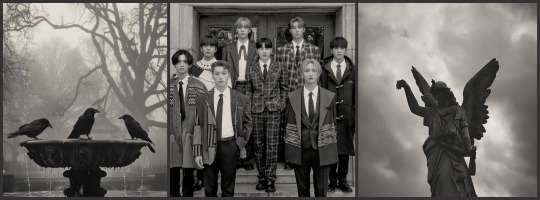
"you need darkness to step out of the darkness."
1941-1943:
Birth years of the Crescents and Luna (1942)
1953:
President Son Seokku’s first presidential term begins
1958:
Pres Son Seokku’s second presidential term begins
Battle of the Eight Hills begins
1960:
Military enforces the 'over-17' law which ensures all 'capable' individuals must enlist and serve in the war, resultantly clashing with President Son
Ateez get drafted at ages 19, 18 and 17
1961:
Luna enlists as a Medical Assistant, aged 19
Elsewhere, Hongjoong comes upon a batch of silver light
1962:
Luna comes across Mingi in early 1962 since they share the same platoon
Treaty of the Eight Hills on September 10th ends the war
Ateez come together as a gang and partner with MX to ensure order in the sectors and begin to rebuild Eden
1963:
Luna comes across Han Hyojoo at a party hosted at Park Byung Eun's mansion to celebrate Lee Jinwook's debut into politics (Lee Jinwook is Han Hyojoo's husband)
Luna gets sent to Wonderland
President Son’s term concludes
Han Hyojoo becomes the president
1964:
Ateez become a formal organisation and make more connections, especially in the underworld, as rebuilding of Eden continues
1966:
Luna comes back to Eden on 14th August
President Han gets assassinated on 17th August
Sirens Rebel Party is formed in support of President Han
Lee Jinwook wins the elections and his presidential term begins
Ateez partners with Pledis Manufacturers to produce machine parts, and to assemble weapons undercover
Inspector Gong gets demoted and stationed to Sector 1 from Edenary while investigating Han Hyojoo's murder case
1967:
Ateez gets the name 'The Crescent Company' and open their first office in Sector 1
Luna starts to work part-time at MX Pharmaceuticals while MX partners with the Crescents
1968:
The Crescent Bar opens in February in Sector 1
Luna gets a cashier job in April at the Crescent Bar
1969:
Luna gets promoted to bookkeeper in the Crescent Bar
1970:
Story begins (ages 29-27), dated 3rd April.
#you're all gonna need this#(i need it more)#a timeline to refer to when things get ✨confusing✨#fic: the leaders#ateez x reader#ateez mafia au#ateez au#ateez series
108 notes
·
View notes
Text

"The Gang's All Here!"
Most recent picture I have of the kiddies. The date is still wrong though (Should be 1980 instead of 1978). Made for my Picture Perfect AU, but it still works for a "canon" timeline ig.
Pictured here are the OG Afton kiddies! From oldest to young: Fritz, Elizabeth, and of course, David Evan-Christopher Cecil. Looking so, so very happy. Nothing is wrong. Absolutely nothing. Nobodies mum died and certainly no body found out they had a secret hidden sibling that they didn't know about until an hour before the photo was taken.
AU Context:
William Afton gets married a few times over the course of his life. The first time was with this Italian ballerina named Klara. They had two kids together, Fritz in 1969 and then CC in 1977. Between the two, in 1974, Bill cheats on her with a secretary from Fredbear's (Eleanor Schmidt) and then surprise surprise, Elizabeth is born.
He basically didn't acknowledge her for the first five-ish years of her life. You know. As one does with their secret affair baby. But then Klara dies giving birth to CC and he decides his kids need a father. So he marries Eleanor and then tries to mash the two families together like nothing untoward was going on instead of going to therapy or something. IDK. It was the 80s. Shit just happened back then.
#my art#fnaf#fnaf fanart#fnaf au#five nights at freddy's fanart#five nights at freddy's#michael afton#fritz smith#elizabeth afton#fnaf cc#evan afton#chris afton#dave afton#crying child#Picture Perfect AU#tw parental death
60 notes
·
View notes
Text
Damian Wayne al Ghul has magic, canonically, and I don't see it being used the way it could be
So, before I talk about this, yes, I do know that the continuity in DC comics is shaky to say the least and that they have characters change every other comic run, but this is something that has been used in three different comics (To my knowledge) made by different authors! Thus, I'm taking it as canon and I won't accept any word against it.
Okay? Okay! Now let's go. Spoiler alert:
So, to talk about Damian's magic use, we will need to go back some time, specifically, to his great grandmother, Rúh al Ghul. Making her first and only appearance in Robin volume 3. Ruh al Ghul is the mother of Ra's al Ghul, and the head of the League of Lazarus, which originated as a splinter organization of the League of Assassins, lead by Ra's, however, Rúh spread her faith and worship of a demon that inhibited the Lazarus Pit. Taking over the League of Lazarus. After this, the League of Assassins and the League of Shadows, teamed up to fight the League of Lazarus, which resulted in the defeat of the League of Lazarus. To ensure his mother couldn't escape, Ra's himself used magic to keep her locked in the island.
Of course, this could be just the fact that they lived multiple centuries (In Ra's first appearance, it's declared that he's around 700 years old, meaning he was born around the 1200's, though in Batman and Robin (vol 2) #30, he's said to have been looking for Themyschira for over 1000 years.) This means that, over the multiple centuries they've lived, they were bound to learn magic, but stay still. Because now, it comes to Damian's maternal grandmother and the fourth known partner of Ra's, Melisande al Ghul, the mother of Talia al Ghul.
To talk about Melisande, I will have to mix two canons from two different comics, since pre-crisis, Talia was said to have been older than 150 years old:
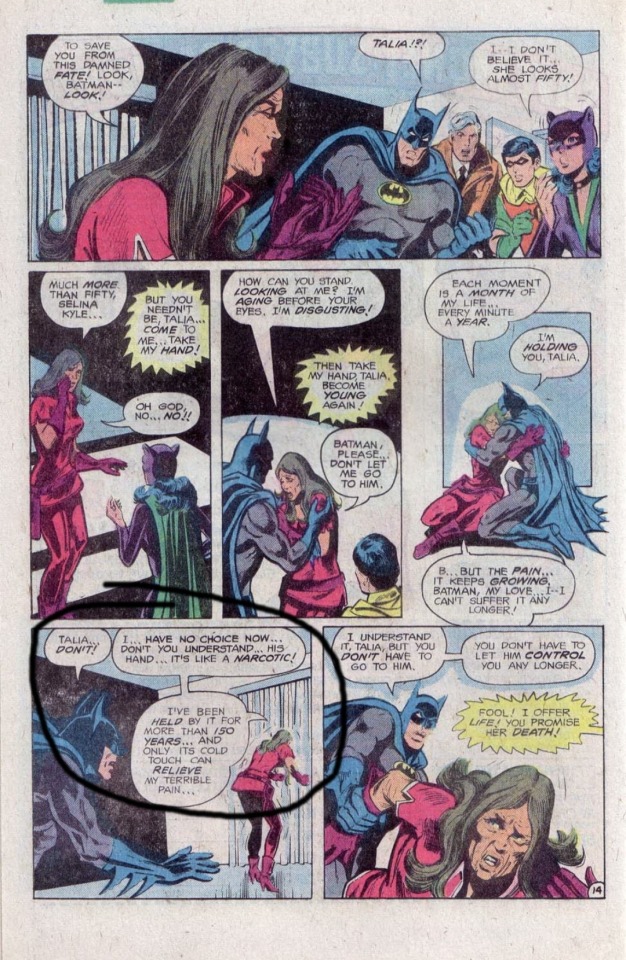
But this was later changed by Danny O’Neil changed this in 1992 with his Birth of the Demon storyline. In this one, Talia said she was conceived at Woodstock (1969), which would’ve put her birthday around May of 1970. Which made her 22 at that time. However, I follow the logic of "What is shown first, is canon", so let's say Talia is +150 years old, meaning she had to be conceived around 1821 (Since her first appearance was in 1971).
So, Melisande story differs in various universes and comics, in Batman: Son of the Demon, her and Ra's foster Ra's nephew, Qayin, who killed Melisande when she caught him in the room where the early version of the Lazarus Pit was being held. When Qayin saw Melisande he got frightened and started running, Melisande was pushed and she fell into the Lazarus Pit and met her death. All of that happened in front of Talia's eyes. But I'll take the Batman incorporated canon for this (And only this) argument. Where after Talia's birth, Melisande was cast out by Ra's and forbidden to see her daughter or from using the Lazarus put. She eventually meets a young Talia years later in her new role as a fortune teller. Of course we can say that she was maybe just doing the typical fortune seller scam to make money, but hey! Considering Ra's and Ruh did dip into the occult, why not consider that maybe Melisande also did learn some magic during the time she was with Ra's?.
Finally, we get to Damian.
Damian seems to be like Rúh, in which he learns/obtains magic by making deals with the devil/a demon, even though it's only been said twice. The first time we see Damian using magic is in Batman 666 (Even if it's written by my racist and sexist enemy G. M0rris0n). Where it's shown to us that Damian exchanged his soul in order to become immortal; of course, this may seem useless to some, because of the pit, but look, if we have to choose between being immortal and having to travel to an undisclosed location in the Middle East to dip into the pit and risk madness, I'd also choose immortality, and it also seems to make him invulnerable or have extremely rapid healing:
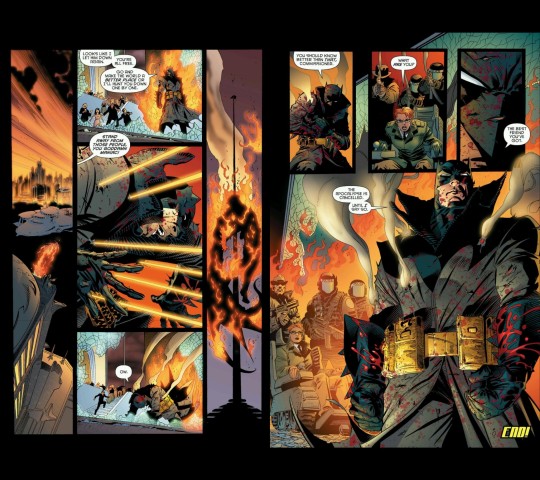
The next time we see Damian use magic is in WAY LESS dire situation, in Batman vol. 3 #77, when he's chasing Gotham girl
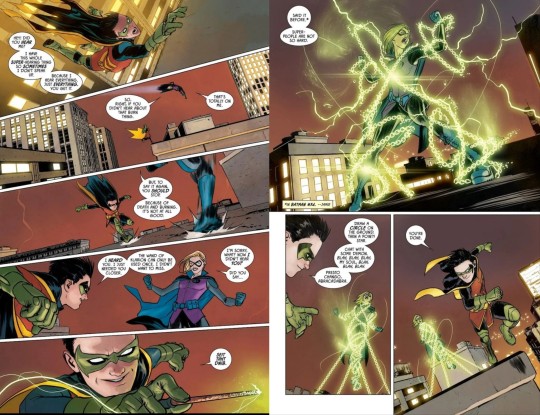
Again, we see that Damian explains he exchanged his soul (Or made a deal involving his soul) with a demon to obtain magic, however, it seems he's unable to use magic unless he's using a wand. And since wands are used as a way to channel magic from the user's core to the outside world, it's safe to say here, he's only obtained magic very recently, and needs the wand to use it. Or, it could be that he's simply joking, as he does tend to have a very dry and sarcastic humour, even early on, which makes many think he's being serious.
Finally, the most recent time we've seen Damian use magic, was in Wonder woman (2023) #13, where he makes a summoning circle to summon Zatanna (While also roasting Superboy)
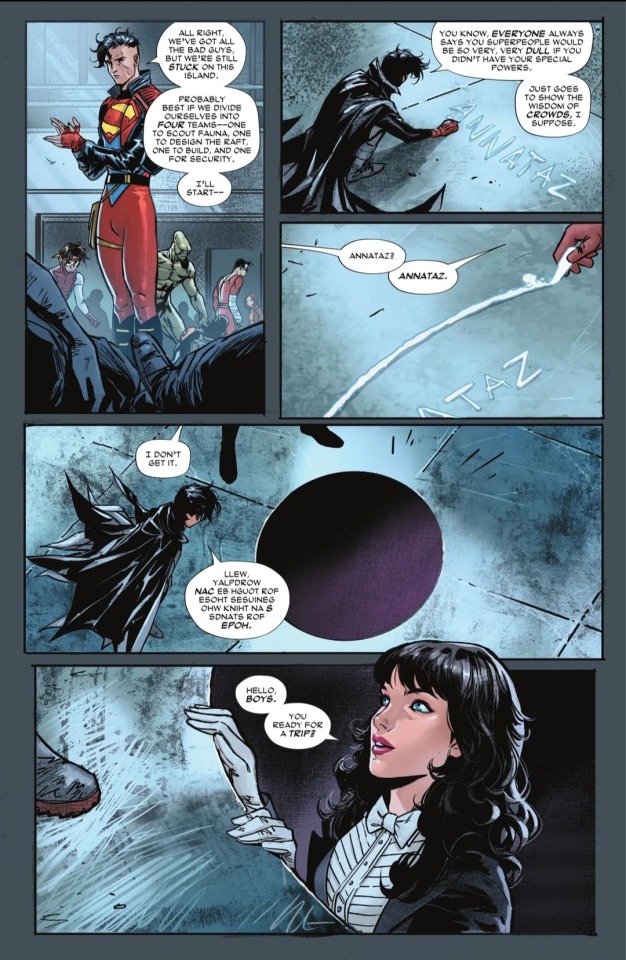
Now, while we do only have three cases (Or at least that I remember) we also have another case that I think could be a sign of Damian's incline for the occult. His pets, specifically, his pet dragons. Goliath the dragon-bat (Robin: Son of Batman) and Wiggles (Nightwing #42)
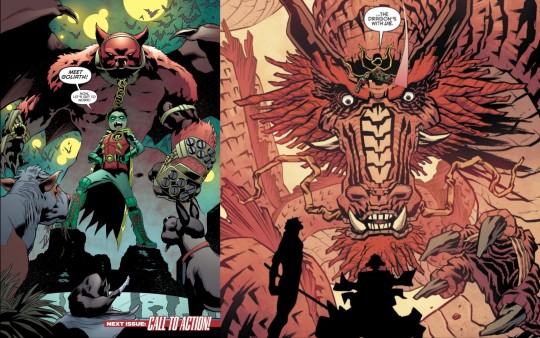
The fact that he seems to be able to tame and even domesticate literal dragons cannot be just a "wink wink, nod nod" from the writers, especially since his name literally means "To tame". He also rides Wiggles almost as soon as he meets him, and I really doubt a dragon just lets people mount him easily.
Also, there are so many more occasions that I left out where Damian does something strange, such as the time he admits he's able to willingly move his organs around his body, or how he can imitate voices just after hearing them once, not to mention he managed to climb snowy mountains at four years old; plus, his strength that has allowed him to beat people three times his size and four times his body weight, as well as letting him kill hundreds of dragon-bats at age six.
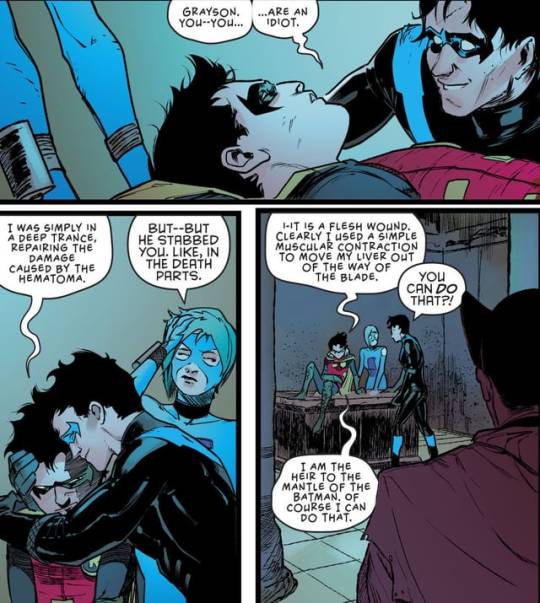
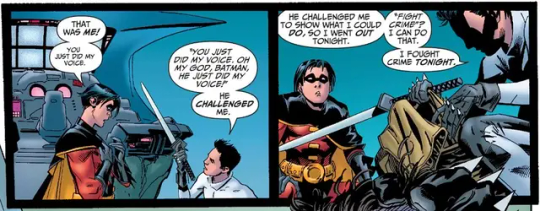
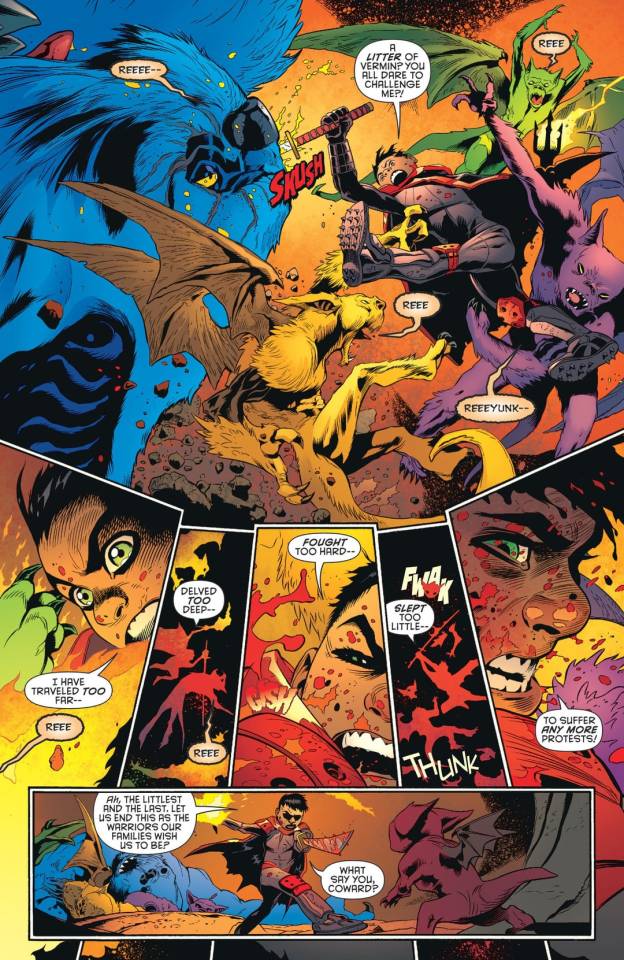
And nowadays it is a pretty popular headcanon, even if I still think it's unpopular in the fandom. But it's still almost unused in the comics and in most works of fanfiction. Here we have a kid who has two dragons and twelve pets total, can imitate voices, move his organs around and has magic (Among other skills), yet his magic is almost never mentioned in fanfic that doesn't center around his magic, and his dragons are almost/often never shown at all! Come on people! You can like or dislike Damian, but you cannot deny that this kid clearly has magic.
Not to mention the potential for canon events, since Bruce does express a dislike towards magic, claiming it is unstable, and unexplainable by science and logic. Imagine all the potential it has! Especially since Bruce has been a pretty crappy dad to say the least towards Damian, since he first met him and even now (Except for that comic where Damian loses all his melanin and all trace of al Ghul from his blood and just looks like Ian Wayne). Imagine having him and Damian having the strained relationship they currently have, but trying to work towards a better one, only for Bruce to discover Damian's.agic and going back to square one? Or Damian becoming a vigilante of his own, since he has expressed desires to maybe stop or pause on being Robin. We already have Duke as a meta being (in my opinion) not used to his full potential, imagine a run where we see Duke and Damian bond due to Duke knowing the fear that lies when you are something Bruce himself disapproves of, since Bruce is also not the nicest to metas. Or Damian having his own team (The friends he made in Lazarus island + Maya and Colin) where he can finally explore his magic.
There are so many things you can do, yet nobody is even scraping the surface of it all.
#damian wayne#batman#dc comics#dcu#batfam#damian al ghul#ra's al ghul#melisande al ghul#rúh al ghul#talia al ghul#my post
90 notes
·
View notes
Note
Dude. How many wives did Ra's have? Because I know of about 3 women but at the same time the comics been revamped 10000 times. I don't know anymore
He had a handful of them over the span of nearly 1000 years but really the only two important ones are Sora and Melisande.
Sora was his first wife before he became Ra’s al Ghul. She was the daughter of an elderly physician. Ra’s wanted to learn from the physician, and the physician agreed only on ine condition—that Ra’s marry his daughter Sora.
Ra’s agreed and they got married. At first they didn’t really care for marriage but they ended up falling deep in love. She was murdered and that is what pushed Ra’s in to becoming Ra’s al Ghul (his birth name is unknown). She was his first wife and first love and losing her is pretty much what made him what he is now.
And Melisande is Talia’s mother. Ra’s met her at Woodstock music festival in 1969 and they were both hippies and got freaky about it, resulting in Talia.
Between them (and after) I’m sure he’s had he had other wives and lovers and even kids with lots of people but they just aren’t important to him or his story. He does not gaf. sometimes he just has hella game for no real reason at all.
41 notes
·
View notes
Text

In 1980 Peter Brown, a former assistant to Brian Epstein who later ran Apple Corps, managed the Beatles and was best man at John Lennon and Yoko Ono’s wedding, started work on the definitive account of the Beatles. With the American author Steven Gaines, he spoke to the three surviving band members alongside wives, girlfriends, managers, friends, hangers-on and everyone else in the Fabs’ universe. The book promised to be the last word in Beatles history. Then in 1983 The Love You Make was published, and all hell broke loose.
“They were furious,” recalls Gaines, 78, still sounding pained at the memory. “Paul and Linda tore the book apart and burned it in the fireplace, page by page. There was an omerta, a code of silence around the Beatles, and they didn’t think anyone would come forward to tell the truth. But Queenie, Brian Epstein’s mother, told us above all else to be honest.”
“Even she didn’t think we would be quite so honest,” adds Brown, 87, his upper-crust English tones still in place after five decades in New York.
Why did The Love You Make, retitled by Beatles fans as The Muck You Rake, incite such strong feelings? The suggestion of an affair between Lennon and Epstein on a holiday to Barcelona in April 1963, only three weeks after the birth of Lennon’s son Julian, had something to do with it, but more significantly it was taken as a betrayal by a trusted insider. Brown and Gaines locked the recordings in a bank vault and never looked at them again — until now.
“Very good question,” Brown says, when I ask why he and Gaines have decided to publish All You Need Is Love, an oral history made up of the interview transcripts from which The Love You Make was drawn. He is speaking from the Manhattan apartment on Central Park West where he has lived since 1971. “When [Peter Jackson’s documentary] Get Back came out, a journalist from The New York Times wanted me to talk. I told him I hadn’t talked about the Beatles since the book was published and suggested he go to someone else. He said, ‘There isn’t anyone else. Paul, Ringo and you are the only ones left.’ And I thought, do I have a responsibility to clear it all up, once and for all?”
After the death of Epstein in 1967, Brown assumed the day-to-day responsibilities of managing the Beatles and Apple Corps. He had on his desk a red telephone whose number was known only to the four Beatles. Unsurprisingly, given his insider status, the interviews make for fascinating reading. Paul McCartney, yet to be asked the same questions about the Beatles thousands of times over, is remarkably unguarded. Asked by Gaines if the other Beatles were anti-Linda, he replies: “I should think so. Like we were anti-Yoko.” On the image the Fabs had for being good boys on tour, he says, “You are kidding,” before going on to reference a notorious incident involving members of Led Zeppelin, a groupie and a mud shark, concluding: “No, not in the least bit celibate. We just didn’t do it with fish.”
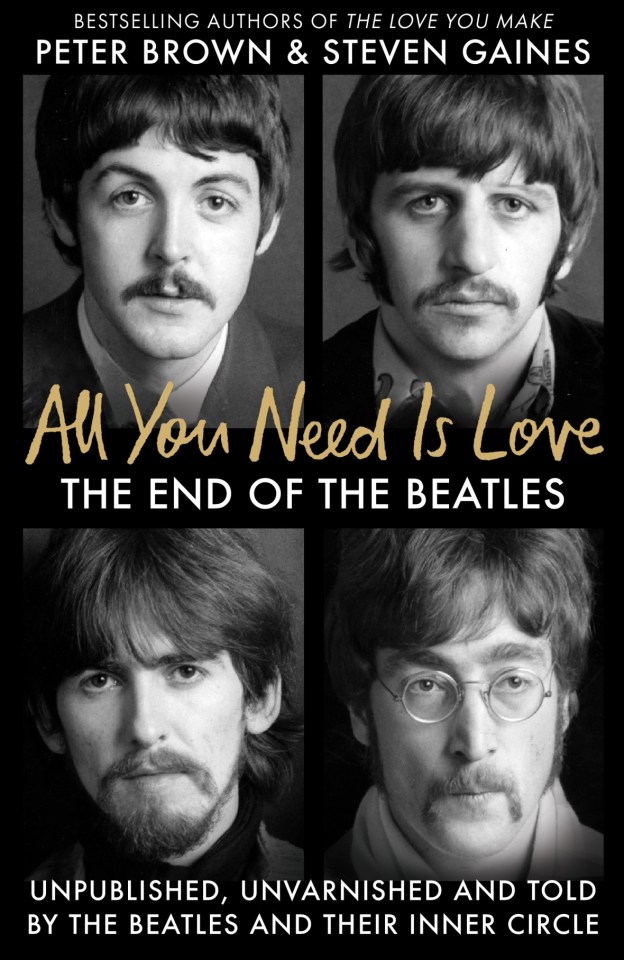
Ono, speaking in the spring of 1981, not long after Lennon was killed in December 1980, reveals that she didn’t sleep with Lennon for the first two years of their relationship — “John didn’t know how to make a move” — and claims that she was blamed by the Beatles camp, George Harrison in particular, for getting Lennon onto heroin in 1969. “Everything we did in those days, anything that was wrong, was my responsibility,” she tells Gaines. But everyone, from the Beatles’ notorious late-period manager Allen Klein to the Greek electronics wizard/hustler “Magic” Alex Mardas — “the Mordred of the Beatles’ Camelot” according to Brown — has their own version of events.
Going through the transcripts reminded Gaines of the long shadow cast by Lennon. “I didn’t realise how sensitive the other Beatles were to John’s opinion,” he says, speaking from his home in the Hamptons, Long Island. “Paul worried about what John would say [in the event Lennon died before being interviewed] and was still longing for his friendship. George said that John didn’t read his autobiography because it was called I, Me, Mine. Those interviews were done before John’s death and Paul’s heart was broken, even then. It wasn’t just the break-up of the Beatles. It was more personal than that.”
From around 1968, the transcripts reveal how the key Beatles duo started to come apart. McCartney’s enthusiasm was only getting stronger. But Lennon grew increasingly bored and disillusioned. “You have to remember that John wasn’t in love with his wife Cynthia,” Gaines says by way of explanation. “He wanted to get away from the life he was leading and that’s why he started to experiment with drugs, all the way up to heroin.”
Brown says Ono was, and probably still is, a distant, mysterious character, exactly the kind of person Lennon was looking for, having done the right thing and married the sensible, quiet Cynthia after she discovered she was pregnant with Julian in 1963. “John told me about meeting this woman, and how frustrated he was that he couldn’t get to know her better; he couldn’t take her to lunch because it would cause gossip. I gave him the key to my apartment so he and Yoko could be together in private and thought, naturally, they were going there to f***. When I went home that evening, the apartment was untouched. They did nothing more than sit on the sofa and talk. That’s what they wanted: to know each other.”
Regarding the long-held, unfair suggestion that Ono broke up the Beatles, Gaines says: “Yoko came along at the right moment to light the fuse, but the dynamite was already packed. They resented her, she was difficult to understand and had a deep effect on John, but they were getting more and more unhappy with each other and needed to have their own lives. As people in the interviews say again and again, [the split] was bound to happen.”
It was Brown who in May 1968 introduced McCartney to Linda Eastman, an ambitious young American photographer whom he knew from his business trips to New York, when she came to London on an assignment to shoot the Rolling Stones. “I was having dinner with Paul at the Bag O’ Nails [a club in Soho] when she turned up, so I introduced them and he was obviously taken with her,” Brown recalls. “The following Friday, May 19, we were holding a party for 12 top photographers at Brian Epstein’s house in London when she walked in. Paul says I didn’t introduce him to his wife … but I did.”
If the book has a villain it is Klein, the New York accountant who took over management of the Beatles and sacked everyone around them, much to McCartney’s horror. As Brown puts it: “He was a hideous person. He even looked like a crook: sloppy and fat, always wearing sneakers and sweatshirts. Everything he didn’t like was ‘for shit’.”
You wonder why Lennon fell for him. “The interviews suggest it is because Allen Klein offered Yoko a million dollars for her movie project,” Gaines says. “She was enticed and John would do anything Yoko said.”
“I asked Mick Jagger to come over and explain to the four Beatles who this Allen Klein was,” Brown remembers. “And John, in his wonderful way, had Klein turn up to the same meeting, which was deeply embarrassing. It made Mick very uncomfortable too.”
Epstein, the man who saw the Beatles’ potential in the first place, is a central figure in All You Need Is Love. It includes a transcript of a recording of him from 1966, not used for the original book. It was in the possession of Epstein’s attorney Nat Weiss, and seemingly made by Epstein to mark the end of the Beatles’ final tour. He claims not only that Lennon felt remorse for the infamous comment on the Beatles being bigger than Jesus — “What upset John more than anything else was that hundreds of people were hurt by that” — but that the Beatles would tour once more. “There’s no reason why they shouldn’t appear in public again,” Epstein claims. They never did, unless you count that rooftop performance on January 30, 1969.
“Brian was driving them around the north of England in his car for a year,” Brown remembers of the early days. “This Jewish guy from Liverpool, who was gay, was with these guys who had been hanging around in Hamburg, so both had interesting backgrounds. They understood each other.”
For Gaines, a self-described “gay Jewish boy from Brooklyn”, Epstein is at the heart of the story. “Brian never felt the love of a real relationship. Then he found the Beatles. Everyone thought it would be just another of his phases, but he had tremendous feelings for John, both sexual and intellectual, and that’s what really pushed him. If there was one thing that started the whole thing off, it was Brian’s love for John Lennon.”
That love affair was the contentious issue of the original book. In his interview, McCartney says of Lennon going to Spain with Epstein: “What was John doing, manipulating this manager of ours? Sucking up to him, going on holiday, becoming his special friend.” It wasn’t the suggestion of a homosexual relationship that was troubling McCartney, but the balance of power tilting in Lennon’s direction.
“Paul wanted to be in charge, and he deserved to be because he was the motor, the driving force,” Gaines says. “Paul felt that John would steal away the power. He felt threatened by John’s relationship with Brian.”
“Paul always wanted to be active,” Brown adds. “After Brian’s death the world had to be carried on. Who was going to do that? It wasn’t going to be John, George or Ringo. Brian was my best friend and I was very upset [at his death]. I had to go to the court to convince the magistrate that it wasn’t a suicide, and the following day Paul set up a meeting so we could discuss what we would do next. I said we’d do it next week, and he said, ‘No, it has to be now.’ He was right.”
How did Brown and Gaines feel about the horrified reaction to the book, not just from fans but the Beatles themselves? “The world has changed,” Gaines says, by way of answer. “Now, after all these years, hopefully people can see it as a truthful, loving and gentle book.” It has been decades since Brown spoke to the surviving Beatles and he has not contacted them about this new publication.
What the interviews really capture in eye-opening detail is the story of four young men who became a phenomenon, then had to deal with the fallout as the dream ended. On December 31, 1970, the day McCartney sued the other three to dissolve the partnership, Brown handed in his resignation as the Beatles’ day-to-day manager and officer of Apple Corps. Ringo Starr said to him: “You didn’t want to be a nursemaid any more, and half the time the babies wouldn’t listen to you anyway.” Brown moved to New York and became chief executive officer of the Robert Stigwood Organisation. But the Beatles never fully left him, and in the wake of Get Back — and the news that Sam Mendes is to direct four biopics, one on each Beatle — he decided he had one last job.
“We have finished our responsibilities,” Brown says with quiet authority. “It is the end of the story.”
EXTRACTS
‘It’s like bloody Julius Caesar, and I’m being stabbed in the back!’
Paul McCartney on the Beatles signing Allen Klein as manager against his wishes
[John Lennon] said, “I’m going with [Allen] Klein, what do you want to do about it?” and I kind of said, “I don’t think I will, that’s my roll.” Then George and Ringo said, “Yeah, we’ll go with John.” Which was their roll. But that was pretty much how it always ended up, the three of them wanted to do stuff, and I was always the fly in the ointment, I was always the one dragging his heels. John used to accuse me of stalling. In fact, there was one classic little meeting when we were recording Abbey Road. It was a Friday evening session, and I was sitting there, and I’d heard a rumour from Neil [Aspinall, road manager] or someone that there was something funny going around. So we got to the session, and Klein came in. To me, he was like a sort of demon that would always haunt my dreams. He got to me. Really, it was like I’d been dreaming of him as a dentist. Anyway, so at this meeting, everyone said, “You’re going to stall for ever now, we know you, you don’t even want to do it on Monday.” And I said, “Well, so what? It’s not a big deal, it’s our prerogative and it could wait a few more days.” They said, “Oh no, typical of you, all that stalling and what. Got to do it now.” I said, “Well, I’m not going to. I demand at least the weekend. I’ll look at it, and on Monday. This is supposed to be a recording session, after all.” I dug me heels in, and they said, “Right, well, we’re going to vote it.” I said, “No, you’ll never get Ringo to.” I looked at Ringo, and he kind of gave me this sick look like, yeah, I’m going with them. Then I said, “Well, this is like bloody Julius Caesar, and I’m being stabbed in the back!”
‘You don’t like to see a chick in the middle of the team’
Paul McCartney on Yoko Ono
Give Yoko a lot . . . that was basically what John and Yoko wanted, recognition for Yoko. We found her sitting on our amps, and like a football team, an all-male thing, you really don’t like to see a chick in the middle of the team. It’s a disturbing thing, they think it throws them off the game or whatever it was, and these were the reasons that I thought, well, this is crazy, we’re gonna have Yoko in the group next. Looking at it now, I feel a bit sorry for her because, if only I had been able to understand what the situation was and think, wait a minute, here’s a girl who’s not had enough attention. I can now not make this into a major crisis and just sort of say, “Sure, what harm is she doing on the amps?” I know they would have really loved me. You know, we didn’t like Yoko at first, and people did call her ugly and stuff, and that must be hard for someone who loves someone and is so passionately in love with them, but I still can’t — I’m still trying to see his point of view. What was the point of all that? They’re very suspicious people [Lennon and Ono], and one of the things that hurt me out of the whole affair, was that we’d come all that way together, and out of either a fault in my character, or out of lack of understanding in their character, I’d still never managed to impress upon them that I wasn’t trying to screw them. I don’t think that I have to this day.
How Cynthia Lennon was driven to drink — at an ashram
Alexis ‘Magic Alex’ Mardas on Ono’s love letters to Lennon
Alexis Mardas was also known as Magic Alex, a name John bestowed on him because he was so taken with Alex’s inventions. Alex was handsome, charming, and a charlatan. (He sued The [New York] Times in Britain for calling him a charlatan and settled out of court. He’s dead now.)
[The Maharishi] was fooling around with several American girls. The Maharishi was making all of us eat vegetarian food, very poorly cooked, but he was eating chicken. No alcohol was allowed in the camp. I had to smuggle alcohol in because Cynthia wanted to drink. Cynthia was very depressed. John was receiving letters from Yoko Ono. Yoko was planning to win John. She was writing very poetic and very romantic letters. I remember those letters because John was coming to me with the letters, and Yoko was saying to John that “I’m a cloud in the sky, and, when you read this letter, turn your head and look in the sky, and if you see a small cloud, this is Yoko. Away from you but watching you.” Poor Cynthia was prepared to do absolutely everything to win John. She was not even allowed to visit the house where John was staying. She was longing for a drink. Now, drinks, they were strictly prohibited in the ashram, but when it was discovered that Maharishi had a drink, I said, “Just a second, at least equal.”
‘He’s become so nasty’
George Harrison on reaching out to John Lennon
What’s wrong with John, he’s become so nasty. It sounds like he hasn’t moved an inch from where he was five or six years ago. I sent Ringo, John, and Paul all a copy of my book. I got a call from Paul. He called me up just to say how much he liked it. I shouldn’t have called it I Me Mine, because that title was a bit much. I sent a copy to John. I’m wondering if he’s actually received it, if he’s received it, he probably doesn’t like it or something offends him about it.
‘I told John that ... it was just a nice feeling’
Yoko Ono advising John Lennon how to take heroin
George said I put John on H, and it wasn’t true at all. I mean, John wouldn’t take anything unless he wanted to do it. When I went to Paris [before I met John], I just had a sniff of it and it was a beautiful feeling. Because the amount was small, I didn’t even get sick. It was just a nice feeling. So I told John that. When you take it properly — properly is not the right word — but when you really snort it, then you get sick right away if you’re not used to it. So I think maybe because I said it wasn’t a bad experience, maybe that had something to do with it, I don’t know. But I mean so, he kept saying, “Tell me how it was?” Why was he asking? That was sort of a preliminary because he wanted to take it, that’s why he was asking. And that’s how we did it. We never injected. Never.
‘It was time’
Ringo Starr on the end of the Beatles
Ringo Starr: Well, I’m pleased it happened because in so many ways, I’m glad it’s not going now. It was time. Things last only so long. Steven Gaines: The Rolling Stones are [still] going. Ringo Starr: Yeah, but they’re old men.
(source)
164 notes
·
View notes